#episode 46 part 4
Photo


Way to keep it on the down low, guys.
Episode 46 Part 4
First < Previous > Next
Season 1, Season 2, Season 3, Season 4, Season 5
Ep 41, Ep 42, Ep 43, Ep 44, Ep 45, Ep 47
Bonus:

(Look, Max should’ve had a way more concerned reaction to this discovery)
Bonus Bonus:

Just remember, you guys started it.
Ko-fi | Patreon
#it's freakin' ON!#scarlet lady#scarlet lady au#scarlet lady comic#party crasher#wayhem#episode 46 part 4
5K notes
·
View notes
Text
I watched James Somerton's final video, and all I got was this 6 page document
As soon as I learned his final unreleased video was on Revolutionary Girl Utena, I knew I had to hate watch it. I didn't know that I'd spend the following 4 hours making a comprehensive doc on everything I hated about it. But here we are.
The TLDR (is this too long to be a TLDR?)
The intro section, as well as Part 2, are directly plagiarized from wikipedia. The rest is unclear.
He makes a “haha this show is so weird right guys” joke 10 different times
He reads Anthy as so emotionally stunted she literally has to be taught how to think for herself, and believes that being the rose bride makes her feel good
He says that his reading is ‘vastly different” from the rest of the community, before boldly stating that this is because he sees it as a “deeply allegorical and symbolic story”
He sees the sexual abuse as “not to be taken literally”
Insists that the show be separated into parts that are strictly literal and strictly allegorical for the entirety of parts 3 and 4, before making the contradictory move of analyzing characters as allegories during part 5
The only characters that get dedicated sections are Akio and Dios, who he doesn’t believe are the same person.
He says Dios gets his powers by “deflowering women”
He calls Akio, known child predator, a chaotic bisexual
Uses 14 year old SA survivor Anthy’s passive personality to make a joke about her being a bottom
His final point is that Utena was the real prince all along
There are no citations
Anyway, full version for people who hate themselves under the cut. With time codes, because I cite my sources.
Part 1: Intro
This entire section is almost exclusively quoted from the Wikipedia article for Revolutionary Girl Utena. Words have been changed, but the order at which certain topics come up is not. Highlights include:
0:56 In his introduction of Be-Papas, lists the founding members in literally the exact same order as Wikipedia.
1:40-2:00 His list of Be-Papas previous works is lifted entirely from wikipedia, only with the words changed. This leads to a strange moment at 1:52 where he claims Be-papas ‘lent their talents to’ Neon Genesis Evangelion, a show which started production at least a year before Be-papas was founded. On the wikipedia article for Utena, this is instead referring to the previous work of Shinya Hasegawa and Yōji Enokido
4:23 he uses a quote by Yūichirō Oguro describing the production as a “tug of war”. He seems to have lifted this in its entirety from Wikipedia, as he does not cite the actual source it is from (the box set companion book, btw)
As for James Somerton originals, at 0:44 he claims that out of all magical girl series,”none to my knowledge have been more discussed and dissected than the 1997 series Revolutionary Girl Utena” He will go back on this at 5:05, where he states that “Sailor Moon takes the lion’s share of discussion” in regard to influential magical girl anime
Part 2: Part 1
(At least I know I’m not funny, unlike James Somerton)
Speaking of which. Here is every single time he makes a “wow this show is sooooo weird you guys” joke: 6:00, 8:50, 10:40, 10:58, 13:46, 17:07, 24:16, 30:34, 41:19, 48:01
Here’s every time the punchline to the joke is the existence of Nanami, a character who he otherwise completely disregards: 10:56, 12:05, 16:22, 42:40
6:16 Claims that the “Apocalypse saga” and “Akio Ohtori saga’ are two names for the same several episodes, depending on the release. This is untrue. Instead, different releases either only have the Apocalypse saga, or split the episodes into an Akio Ohtori saga and then the Apocalypse saga.
7:58 Claims Utena intervening on Anthy’s behalf begins the first duel. While this happens in the movie, Touga intervenes in the scene he uses clips from (like literally right after the shot he uses in the video). Utena only gets drawn into the duels when Wakaba’s love note to Saionji is posted. Youtuber Noralities’ Utena video also gets this wrong, which makes me wonder if this was copied.
9:09 Claims Akio’s “End of the World” moniker is actually more closely translated to “Apocalypse”. In reality, the translation moves away from a more apocalyptic reading, with 世界の果て (Sekai no hate) apparently translating closer to “the furthest reach of a known world” or “edge of the world”. (Love the implications of this translation, but I digress)
9:10 As can be assumed from the previous point, this means I can’t find any sources that point to them not using the title “apocalypse” for religious reasons
10:10 Uses Anthy’s extreme passivity under her Rose bride persona to make a top/bottom joke. I’m gonna repeat this in case you’re just skimming. He uses a trait that likely stems from years of abuse, (possibly exaggerated by the persona Anthy uses to manipulate people), and uses it to call her a bottom.
He also just doesn’t seem to understand how the whole point of Utena constantly telling Anthy that she's just a normal girl who should make more friends is framed as Utena imposing her will on Anthy, just as much as the previous Engaged have done.
11:54 Apologies in advance for my most “um, actually!” point yet, but technically his statement that Anthy stops being host to the Sword of Dios is wrong. Akio literally pulls a sword out of her chest in the final duel. It's a more evil-looking sword of Dios, granted.
13:02 !!! CANTARELLA SCENE ALERT !!! He interprets it as them fighting over Akio?? Which like. I will allow people to have their own interpretations of vague and symbolic scenes. I will. I swear. This is not technically incorrect. It just makes me want to eat my own intestines.
14:44 Bad Anthy take #1: He states Anthy “is emotionally stunted to the point where she needs people to make decisions for her because she does not know how to think for herself” This ignores several moments of Anthy clearly making her own choices throughout the show, including the suicide attempt Somerton mentions about a minute prior. This also strips Anthy of what little agency she has throughout the story, usually exerted through messing with Utena or Nanami. (The fact that she repeatedly makes choices that contribute to her own abuse is, in my opinion, one of the most interesting parts of her character, and it's a shame that Summerton’s ‘reading’ of the story completely disregards that)
Additionally, he once again reads Utena ‘urging Anthy to think for herself” in the first arc as an unambiguously good move, and not as something critiqued in the show.
14:52 Summerton reads the Swords of hatred as symbolizing men’s hatred specifically. Again, I’m trying not to completely disregard differing interpretations to a show like Utena, but this feels very simplistic, especially considering the harm we see aimed towards Anthy by other women
16:42 Here he claims that his reading of the story seems to be “vastly different” from the bulk of Utena discourse. What is this reading? That the show shouldn’t be read literally. Or, in his words, “[we can interpret] Revolutionary Girl Utena as a deeply allegorical and symbolic story about the struggles of coming of age amidst widespread institutional corruption in a high school and which describes a passive culture of inaction in regard to brazen instances of domestic exploitation in which there is not only a question about the caporeality of the events transpiring but also which events can be taken for granted and which events are meant to signify abstract sociological institutions.” The idea that he believes this is in any way a new reading of the material honestly baffles me.
Part 3: Part 2
17:48 through 18:50 differently quotes the Wikipedia article for postmodernism. He even makes a joke at 17:55 about Wikipedia. Please kill me.
The first three themes he lists at 19:11 are just the three main themes listed on the Revolutionary Girl Utena Wikipedia page. What was that about a “vastly different” reading, James?
You’re gonna have to take my word for it, but this section is so short because it's just him talking about the various ways the story can’t be taken literally. He does, ironically, call this a hot take.
Part 4: Part 3
Here’s where the reading falls apart folks
At 23:15, he states that some things in Utena are allegorically coded, while others are to be taken literally. This is true. However, he seems to take this to mean that some parts of the show are Strictly Literal, while others are Strictly Allegorical for things going on in the Literal World.
This is apparently why he prefers the Anime to the Movie, where there basically is no separation between the Literal and Allegorical
This take is bizarre to me for several reasons, but here is my favorite. At several points, he mentions how Revolutionary Girl Utena is a work of Magical Realism. Magical Realism is literally defined by its blending of the “literal” and “allegorical”, the mix of fantastical elements in a mundane, realistic setting. This idea of the impossibility of a blurred line, that Utena must either have lore where the magic is all real and means nothing, or dedicated allegory segments quarantined from the rest of the story, is contrary to the very idea of Magical Realism.
I can’t help but wonder if Somerton took his mentions of Magical realism from a previous work, due to how little it is consistent with his final argument. Either way, this section suggests a great lack of creativity in his analysis, a shame for such a creative work.
24:36: Shiori slander, for those who care
After this he gets really worked up about people assuming symbolism in everything, even when the author ‘doesn’t make it clear something is symbolic’. He shuts down a reading of a shot in the Lord of the Rings. Miley Cyrus is there? Very The Curtains Were Blue of him.
28:22 Claims that Wakaba is the key to telling where the Strictly Literal segments end and the Strictly Allegorical segments begin. He states that, under this lens, deeply personal moments of character suffering such as all of the sexual abuse and Anthy’s suicide attempt (which he literally cites) should be read as symbolic and be “approached with uncertainty rather than confusion”. (28:24-29:13)
This also somewhat falls apart when you consider Wakaba is the jeep in the movie's car chase
And then he rants about people not liking his Attack on Titan video for a bit. Since its potential symbolism also doesn't follow hard enough rules to be symbolism. Once again, the separation of “fact vs allegory” I haven’t watched AOT, so that's all I’ll say.
Part 5: Part 4
Thank god this part is short. Much like Dios’ on-screen presence.
32:55 Makes the extremely bold claim that Dios is not Akio. As in, never even became Akio. because Dios is Strictly Allegorical.
Just to be a pedant, this is pretty explicitly disproven in the show



Confusingly, both earlier and later he will address these two as the same character.
33:04 he also explains the root of Akio’s name in a tone that suggests this is supplemental information and not like. Literally something he explains out loud in the show?
Part 6: Part 5
This section is nearly entirely about Akio Ohtori. I would like to note that him and Dios are the only characters with dedicated segments.
38:30 The part where he states that Dios gets his powers from deflowering women.
38:46 Claims, once again, that Akio’s abuse of Anthy “may not be literal”.
38:59 “the instance of exploitation here is used because assault has deep roots as indicating that akio's gender is the source of his imbalance” THE ASSAULT IS ABOUT AKIO NOW???
39:45 Bad Anthy take #2: “Anthy’s conformity to the Rose bride is based around the fact that she feels good being subservient because this is the only thing in her life that has ever brought her any kind of positive reward”. This is a direct quote. Anyway, I can’t think of any instances in the show where Anthy’s subservience gives her a positive reward, except maybe when she’s intentionally using it to manipulate others. As for her feeling good being the rose bride. She tries to commit suicide. Dude.
Side tangent, but isn’t this exactly what Akio says during the final 2 episodes? That Anthy enjoys being a witch? Is the main villain, who consistently says things during that very episode that are blatantly false, our source of information for this take? I guess so, since this is the dedicated Akio section.
At 40:20 he decides to introduce the concept of Anthy, Akio, and Utena as stand-ins for wider concepts, which is antithetical to his approach in analysis beforehand
Part 7: Part 6
42:40 he finally acknowledges that he’s been spending too much time talking about Akio, and literally no time on characters like Nanami
46:10 states that Utena’s exclusive motivation “is to protect Anthy from the predatorial intentions of the other dualists”, which disregards the fact, which she states herself, that she was largely participating in the duels and protecting Anthy to feel like a prince
48:04 The part where he says that Akio has ‘chaotic Bi vibes’ in regards to him sleeping with Touga, who is 17 and implied to be a long-term victim
Part 8: Part 7
54:01: His concluding point is that Utena was the real prince all along.
In true Somerton fashion, the video then ends over a scrolling wall of patrons, with not a single citation in sight.
#the autism won again you guys#revolutionary girl utena#james somerton#shoujo kakumei utena#utena#anthy#hbomberguy
2K notes
·
View notes
Text
Have you witnessed discoursing about Orym in the past several months? Would you like to be more well-informed about the subject matter? Well, then, do I have a post for you! As a reference for myself and potentially for others:
A Comprehensive Write-Up Of Relevant Times And Contexts Where Orym Has Brought Up His Dead Family While The Group Discusses The Vanguard/Predathos--With Receipts
Disclaimer: these are all of the instances in which I was able to find independently through the Critical Role transcript search, not from rewatching everything. It is therefore possible there are some instances unaccounted for.
Episode 34. Post-resurrection after being killed by Otohan Thull, he brings up the fact that Otohan had a hand in killing his family to emphasize to Imogen how dangerous Otohan is and that she may potentially continue to be an issue for her specifically due to her apparent interest in Imogen (exalting her during the battle in the previous episode)

2. Episode 46. An early God Talk™️, prompted by Ludinus using (presumably) Feeblemind on Professor Kadija Sumal. He holds his opinion until the very end of the conversation, after entertaining Imogen's idea that "they make some good points" and listening to the group discuss if the gods are good or bad for several minutes.
"I don't need to debate it. I lost my husband and father to these people, I'm not on board. Some of the gods are terrifying, and some of them have put their thumbs on the scales for people for centuries, even in the last few decades. Who are they, who are we to decide who lives or dies, god or mortal or otherwise? I don't think they have any good points."
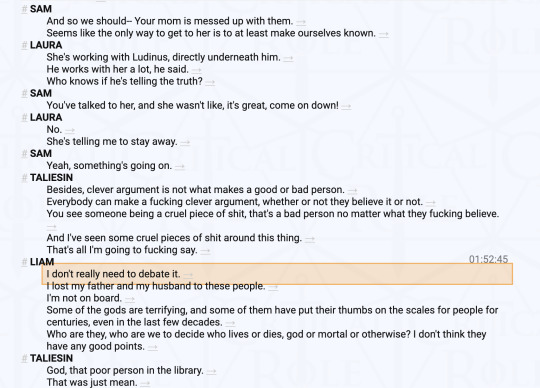
3. Episode 49. He brings them up combatively ("Well, Imogen, I wish. my family didn't have to die for their brighter tomorrow"), against Imogen's statement of, "What if it's not that bad? [...] What if what we're doing is just fighting change?" after she solely received a vision of a Utopia-like future from her mother. Imogen backs down quickly after his reproach and acknowledges that the vision was likely a part of cult brainwashing.
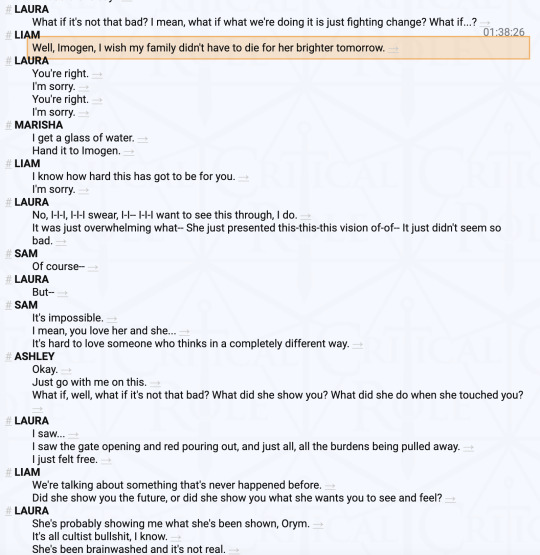
4. Episode 61. Orym pulls Prism aside, after she asks the party and Elder Abbadina if Predathos would cause a world-ending event, or if it would only be bad for some (the Elder did not know anything about Predathos at all), to say, "I don't think we know anything [...] The only thing I have to go on is the track record of the guys trying to bring Predathos out. And that track record is not very good." At further prompting from Prism about if he ever thought the Vanguard's ideas were right, he says, "Prism, I don't understand the gods. I don't know anything about the titans. I don't know an eidolon from eyeliner. [...] But I'm a widower, because of the people who want to bring this about. So it's hard for me to wrangle with the other side."
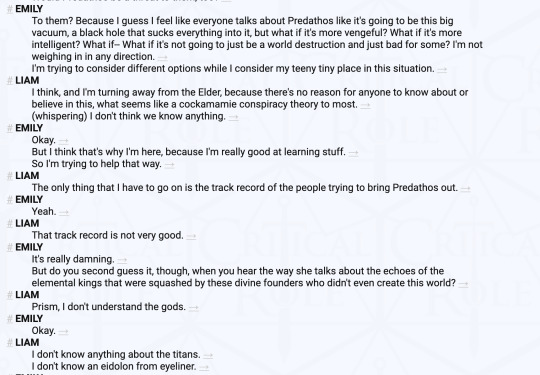

5. Episode 61, pt. 2. Orym listens to the party converse with Elder Abbadina for a little while longer before silently sneaking out "to go think about his dead father and his dead husband."

6. Episode 77. Another God Talk™️ with the whole party, prompted by FCG asking what everyone's motive was in going to the moon. For his reasoning, he says, "We don't know what's going to happen to any inch of this world if Predathos is unleashed. Yeah, this started with my husband and my father. It's so much bigger than that. If my life can secure the lives of everyone who comes after us, well spent."
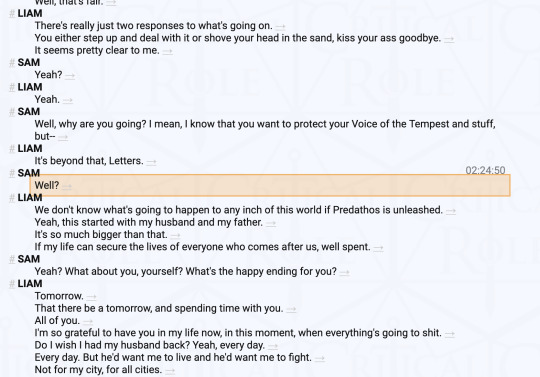
7. Episode 92. After the death of another loved one to Otohan Thull, in response to Liliana's statement that temples might hunt down Ruidusborn in the theoretical event that Ludinus' plot is foiled, "Cold comfort for my family in the ground."
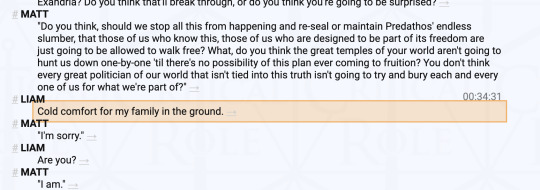
8. Episode 92, pt. 2. In response to a throwaway, thoughtless comment Ashton made that, "I hope [Liliana] is right. I really do. I hope her ends are fucking great because these means are just not forgivable." Orym has Chetney bring out Otohan's sword, jams one into the sand and declares, "This is the sword that killed my father and my husband. She is not right."
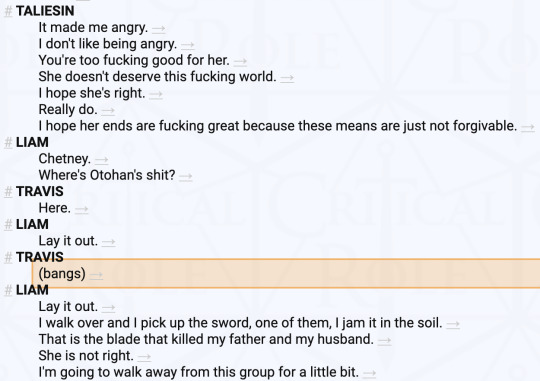
UPDATE: 8/14/24
9. Episode 102, during the confrontation with Ludinus. Interjected during the ongoing conversation, specifically during some bantering between Chetney and Ludinus as to the last time they met (when Chetney attacked him as a werewolf). He says, "You put a hit on my family, a successful one, fuck you. Fuck you." Ludinus later apologizes for the deaths of his family, claiming Otohan was "overzealous in her methods." Both Imogen and Laudna respond immediately that he was responsible for Otohan's actions.


10. Episode 103, during yet another God Conversation. Orym tries to redirect conversation about Ludinus and the gods, stating that they are different topics. Ashton concurs, and Imogen states that she agrees with Orym that Ludinus doesn't get to decide for everyone. Dorian then interjects, "But the gods do?" Which prompts Orym's blunt response to him specifically that, "If Ludinus had sent people to your home, and taken brother and your father and countless others, how philosophical would you be about it, Dorian?"
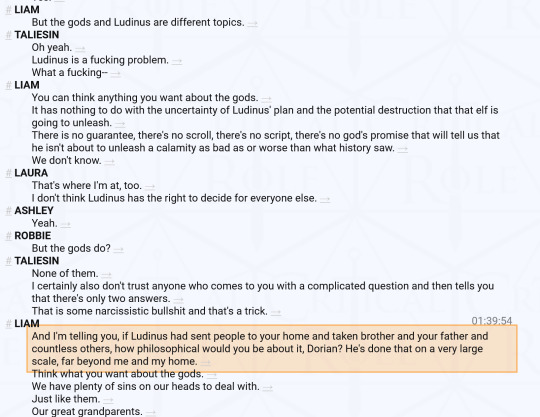
-
So, with all of the information in front of us, what conclusions can we draw from them? When asked by others to assess if the Vanguard has valid points, Orym repeatedly abstains from having an opinion. Whether or not the Vanguard has a reason to be upset is irrelevant to him--what is relevant is the loss of life they have incurred along the way. Orym takes no stance on the gods, he repeatedly states he doesn't understand them or know anything about them or harbor much of a connection to them. As far as he is concerned, his role in this is to oppose the violence being done to the people of Exandria. Why waste your time debating the merits of a cult's ideology when you know, in the end, you will have to fight against them to end the slaughter? To protect people?
And for what it's worth, in almost every instance, Ashton has effectively taken the same side as Orym. I have not included all of these moments, but they are easily located if you wanted to search up these moments on your own. The continual focus on de-legitimizing Orym's opinion seems strongly tied to the fact that he has a personal reason to hate the Vanguard. But facts being facts, Ashton hates them just the same--and he has no love of the gods, either. He hates the Vanguard based on their actions, same as Orym. In fact, Ashton and Laudna have both expressed outright dislike for the gods, and all other Bells Hells except for FCG expressed ambivalence. This is not about the gods. Not for Orym, not for the others who remain. This is about no more bodies on the pyre of Ludinus' machinations.
P.S. if you know of any other instances this topic has come up that I have not included, please feel free to let me know! I want this post to be as comprehensive as it can be, but I am fallible and may have missed something. Don't be afraid to tell me about a scene I missed!
#is this a little bit petty? yes#but also i genuinely did want all the info in one post for reference's sake#so hopefully this reference has helped others as well as decent compilation of information!#cr tag#I contemplated maintagging this. but. maybe that's a little too petty even for me#anyway the people who want to find this will probably find this. so.
207 notes
·
View notes
Text
EVERY EPISODE SO FAR THAT DOESNT END WITH “GOODNIGHT, NIGHT VALE. GOODNIGHT”
SO I finished the list today! This list includes any variation of the phrase, episodes where he just doesn’t say it although present, and episode where he doesn’t say it because he’s not present. I decided to mark colour code them as a result!
• variation, • no goodnight, • no Cecil
Before I start:
I did not include extra episodes like snippets from the lives shows and such.
For the quotes here I only took the final phrase. So anything that breaks the usual scheme like a lack of “stay tuned next” or any lengthy monologue about anything relating to the goodnight phrase, I didn’t quote
I’m thinking about making a video compilation later on but for now I DONT have the space to dowload all these episodes so this will do for now!
If I missed any, lmk!
———————————————————————————
• 1 — Pilot
Good night, listeners. Good night.
• 2 — Glow Cloud
Good night, listeners. Good night.
• 3 — Station Management
Good night, Night Vale. And goodbye.
• 4 — PTA Meeting
Good night, listeners. Good night.
• 5 — The Shape in Grove Park
Good night, listeners. Good night.
• 6 — The Drawbridge
Buenas noches, Night Vale. Good night.
• 7 — History Week
And, from this moment in history, the one that’s happening right now, good night.
• 8 — The lights in Radon Canyon
It is a good night, listeners. Good night.
• 9 — “PYRAMID”
Speaking of the nighttime, I truly hope you have a good one, Night Vale. Goodnight.
• 10 — Feral Dogs
Get your sleep, Night Vale. And don’t forget to dream. Good Night.
• 14 — The Man in the Tan Jacket
Good night, Night Vale. Be alert, and write down everything you cannot comprehend. Until next time.
• 15 — Street Cleaning Day
Good night. Good night. Good night.
• 19B — The sandstorm
Kevin: Until next time, Desert Bluffs, Until next time.
• 46 — Parade day
And until next time, Good Night, Night Va- Hey. Hey. No. What are you-
• 47 — Company Picnic
Kevin: And, as always, until next time, Greater Desert Bluffs Metropolitan Area. Until next time.
• 49A — Old Oak Doors (Part A)
Listeners, there is someone knocking on my station door, which must mean…Carlos? Carlos, is that you? Come in, and welcome home, my sweet Car…
• 53 — The September Monologues
Well, that's it for the September Monologues. We've said so much. What more is there to say?
• 65 — Voicemails
Kevin: Until next time, Cecil. Until next time.
• 67 — [Best Of?]
Leonard Burton: And as always "See ya, Night Vale. See ya."
• 70A — Taking Off
Kevin: Until next time, new Desert Bluffs, until next time. Oh. Oh no. This is so sad. No. I don’t like this. I am sad. No. No.
• 85 — The April Monologues
And so we reach the end of the April Monologues. There is much that could be said. I will say none of it.
• 86 — Standing and Breathing
Good night, Night Vale. (Maybe lock those windows too.) Good night.
• 87 — The Trial of Hiram McDaniels
Good night. I guess.
• 88 — Things Fall Apart
Hello? [very faint breathing] Hello? [very faint breathing] Who is this? [distant dog bark]
• 89 — Who’s a good boy? (Part 1)
“I want nothing, Cecil. Nothing at all. And I will have it.” Huff huff huff. Huff huff Huff.
• 94 — All Right
All right Night Vale. Good night.
• 98 — Flight
Good night.
• 100 — Toast
Good night, Night Vale, and every person who can hear my voice. Good night.
• 101 — Guidelines for Retrieval
Happy purging, Night Vale. And goodnight.
• 104 — The Hierarchy of Angels
Good night, Night Vale. Josie was beautiful. And angels are real. Good night.
• 109 — A Story About Huntokar
Huntokar: Good night, my Night Vale. Good night.
• 111 — Summer 2017, Night Vale, USA
Good night, listeners. Good night.
• 113 — Niecelet
Any second now. Any second. Any... second.
• 120 — All Smiles’ Eve
Lauren: Good night, Kevin. And good night, Desert Bluffs Too.
Kevin: Good night.
• 128 — A Matter of Blood (Part 2)
Oh god, it’s here.
• 133 — Are You Sure?
Is this the first time you’ve heard me say this? Are you sure? Welcome to Night Vale.
• 135 — The Mudstone Abyss (Part 1)
Kevin: Until next time, Desert Bluffs, Until next time.
• 136 — The Mudstone Abyss (Part 2)
Charles: Kevin. I. Handlebar cereal, okay? Handlebar cereal.
VM: End of message.
• 137 — The Mudstone Abyss (Part 3)
Kevin: Until next time, Desert Bluffs, Until next time.
• 148 — The Broadcaster
Leonard Burton: And until tomorrow, "See ya, Night Vale. See ya."
• 156 — The Trouble with Time
Listeners. I must go. I must talk to my husband. We can be together forever, don’t you see? A new world awaits us in the future. I must talk to Carlos. I must.
• 157 — The Promise of Time
Kasper: Believe in a smiling god, buddy. Believe in a smiling god.
• 164 — The Faceless Old Woman (Live)
FOW: And I will be seeing you very, very… soon.
• 171 — Go To The Mirror?
Won’t you have a good night, Night Vale? Won’t you have a good night?
• 175 — The October Monologues
And as the leaves are done, so are the October Monologues. All that can be said has been said. And all that can be said will be said again.
• 177 — Bloody Laws, Bloody Claws: The Murder of Frank Chen
That about does it for me, Night Vale. That about does it for me.
• 195 — Silas the Thief (Part 1)
Silas: And my name is Silas. Not Khoshekh. Okay? Okay.
• 196 — Silas the Thief (Part 2)
And one I have to consider. Am I Khoshekh? I don’t know if I’m ready to admit that just yet.
• 199 — Guidelines for Retrieval
Happy hoarding, Night Vale. Goodnight.
• 200 — Susan Willman Comes Clean
Susan Willman: So let me begin. This is a story about Huntokar, said a voice on the radio. A voice you had never heard before, though she has been speaking to you your whole life.
• 203 — The Kareem Nazari Show
Kareem: Again, really sorry. Uh, so… Take care. I guess.
• 216 — The Ball Is Where The Win Is
Steve: You have already made me so proud
• 221 — The Glow Cloud, Explained
All Hail, Night Vale. All Hail.
• 227 — A Word With Dr. Jones
Lubelle: Show over, Night Vale. Show over.
• 230 — Carlos, Explained
Good night, my Night Vale restored. Good night.
• 237 — Frown Night
Kevin: Until next time, Desert Bluffs Too, Until next time.
• 239 — Sister Cities: Vermillion Falls
Frank Luna: Good evening, Vermillion Falls. Good evening.
• 240 — He Is Holding a Knife
He is holding a knife. He takes the knife, and sets it against the microphone cord. And with one smooth and easy motion, he cuts the co-
• 249 – Rifts
I would say good night, Night Vale…But if a tree falls in the forest, you know?
247 notes
·
View notes
Text
USS Enterprise decks
Updated part 1 here
Updated part 2 here
This post got me thinking about the actual location inside the ship of several areas. Sure, there are many blueprints and reference books that have published complete and detailed layouts of the Enterprise. But ultimately, they're interpretations of different authors, filling in the blanks, and they often disagree with each other.
So this is a list of the bare minimum of facts. All the deck locations that can be gleaned from TOS episodes. Beyond that, it's up to anyone's imagination.
*Feel free to make additions or corrections to this post. This is only in reference to the original ship as seen in the series, not taking into account the refit ship from the movies, or alterations/retcons introduced in later series.
Saucer section (primary hull)
Most locations seen in the series belong to this section (as deduced from the curved corridors).
The first version of the Writer's Guide tell us it has 20 decks. The later edition (season 2 onwards) reduced the decks to 11.
Deck 1
-Bridge: Obvious from a simple inspection of the ship's exterior. And also confirmed by the Writer's Guide to be in this deck.

Deck 2
-The Romulan Commander's "guest" quarters: Spock tells the turbolift to bring them to this deck, before leaving her in detention, in "The Enterprise Incident". I don't think we ever see other location said to be here (maybe she got the whole deck for herself; lucky!).
Deck 3
-Recreation room 6: Rand offers Charlie to come here, in "Charlie X".

-Recreation room 3: Spock says Bele is chasing Lokai in front of this place, in "Let That Be Your Last Battlefield".
-Crewmen's lounge: Same as above.
Deck 4
-Environmental control: Scotty says power's been shut down here, in "The Ultimate Computer".
-Living quarters: Kirk confirms this, in "The Ultimate Computer".
Deck 5
-Sickbay: Kirk brings Spock to this deck after ordering him to report to sickbay, in "Amok Time". He does the same with Elaan of Troyius. Strangely enough, most blueprints place sickbay in deck 7 instead.



-Kirk's quarters: Confirmed in "Journey to Babel", which also shows the cabin number (3F 121). The same number was first seen in "The Conscience of the King", but without specifying the deck.


-Recreation room 3: Spock says Bele is chasing Lokai in front of this place, in "Let That Be Your Last Battlefield". May be a script error, since a moment ago he had said this place was in deck 3.
-Transporter room: As Lokai seems to run directly here, we may assume it's also in deck 5 (though there are probably many more transporter rooms throughout the ship).

Deck 6
-Briefing room: Sargon calls McCoy from here, in "Return to Tomorrow". May be the same briefing room from other episodes.

-Guest rooms: Bele and Lokai are assigned quarters here, in "Let That Be Your Last Battlefield".
-Living quarters: Kirk confirms this, in "The Ultimate Computer".
Deck 8
-Auxiliary control: The android Norman hijacks the controls here, in "I, Mudd".

-Evaluation laboratory: Seen on a plaque, in "And the Children Shall Lead". Kirk and Spock arrived on this deck in search for Auxiliary control, so it should be in deck 8 as well.

Deck 12
-Janice Rand's quarters: In "The Enemy Within", after seeing Rand attacked by evil Kirk, a crewman reports they're in deck 12. The number of her cabin is also visible (3C 46).


-Kirk's quarters: In very early episodes ("Mudd's Women" and "The Enemy Within"), Kirk's quarters were here, instead of in deck 5. Since the number of saucer decks was reduced to 11 in season 2, the change makes sense.
Deck 14
-Transporter room: In "Dagger of the Mind", Dr. Van Gelder is locked in this deck, after arriving inside a cargo box.
-Personnel Director office: Seen on a plaque during Van Gelder's escape.

-Science Library: Same as above.

Unknown deck
These are some locations, likely from the saucer section, but with unspecified deck. There are plenty of such examples, so this isn't an exhaustive list.
-Impulse engines: The Writer's Guide confirms that the impulse engines are in the primary hull, in case of saucer separation. I think the impulse engines are only seen in "The Doomsday Machine", when Scotty is working aboard the identical Constellation. Though they look just as a reused set from Engineering.

-Spock's quarters: The cabin number is seen in "Amok Time" (3F 125). Possibly, it's in deck 5 near Kirk's quarters, considering the similar numbering.


-McCoy's quarters: Only seen in "The Man Trap" (I think), which also shows the number (3F 127). Again, it's probably near Kirk and Spock's cabins.


-Mudd's quarters: The number is barely legible, but looks like 3F 125, in "Mudd's Women". This happens to be the same as Spock's cabin. The likely explanation is that they didn't have a design for Spock's quarters so early in the series. The fun explanation is that they evicted Spock just to make room for Mudd.

-Uhura's quarters: Seen in "The Tholian Web", and adapted for Elaan in "Elaan of Troyius".


-Scotty's quarters: Seen in "By Any Other Name".

-Life Science Section - Botany Department: Seen in "The Man Trap".

-Gymnasium: Seen in "Charlie X".

-Officer's mess: Seen in "Space Seed".

-Botanical garden: Seen in "Is There in Truth No Beauty?".

-Briefing room: Different from the usual briefing room, it's seen in "Space Seed" when they decide Khan's fate.

-Biochemistry lab: Seen in "The Deadly Years".

Since I've reached the picture limit, the continuation with the Engineering hull sets will be in another post, here.
81 notes
·
View notes
Text
How the Todorokis call each other (Part 1)
So since I researched for it for my fic here are a bit of the words the Todorokis use to call/talk about themselves and each other in the Japanese manga (occasionally comparing it with the English translation).
Note that I won’t report names that are too general (when one of the children talks of them as his father ('chichi' 父) or his mother ('haha' 母) or when they refers to their family ('kazoku' 家族) and that sometimes, in English, the characters seemed to call someone in a certain way but the same didn’t apply in Japanese.
In order to make things simple I’ll group the characters when a Japanese term is used multiple times, so as to explain what it means only once. In part 2, as well as ending with the list of ways they call each others, I’ll put a summary for each character, so that if you want to know what a specific character use, you can do it more quickly.
Just remember the Todorokis, being a family, tend to use casual speech to talk among them, so they use many words which would be rude if they were to use them with other people but which are perfectly okay between family members. Also in the Japanese family hierarchy, Enji is above his children and wife, Rei is above her children and, in regard to the children, older siblings are above younger siblings.
It's worrth to say I’m not Japanese. The explanations of Japanese terms come from me reading plenty of Japanese dictionaries and grammars but I might have done mistakes or missed something... or missed some way the Todorokis used to refer to each other (as there's actually plenty of quotes). Consider yourself warned and feel welcome to write me if you think I missed something.
HOW DO THEY SAY “I”
Ore (俺/おれ Lit. “Oneself”)
In normal situations all the Todoroki males use ‘ore’.
This term is the most casual form of self-address used by men, which establishes a sense of masculinity. It can be seen as rude, depending on the context, as it’s suitable for conversations among close friends or relatives but not in polite conversation. It emphasizes one’s own status when used with peers and with those who are younger or of lesser status. Among close friends or family, its use conveys familiarity rather than masculinity or superiority. It was used by both genders until the late Edo period and still is in some dialects.
It’s notable how Tōya used ‘ore’ even before Natsuo’s birth so when he was 4 or younger (Natsuo was born after he turned 4). Very likely, despite being so young, he was copying his father’s speech pattern.
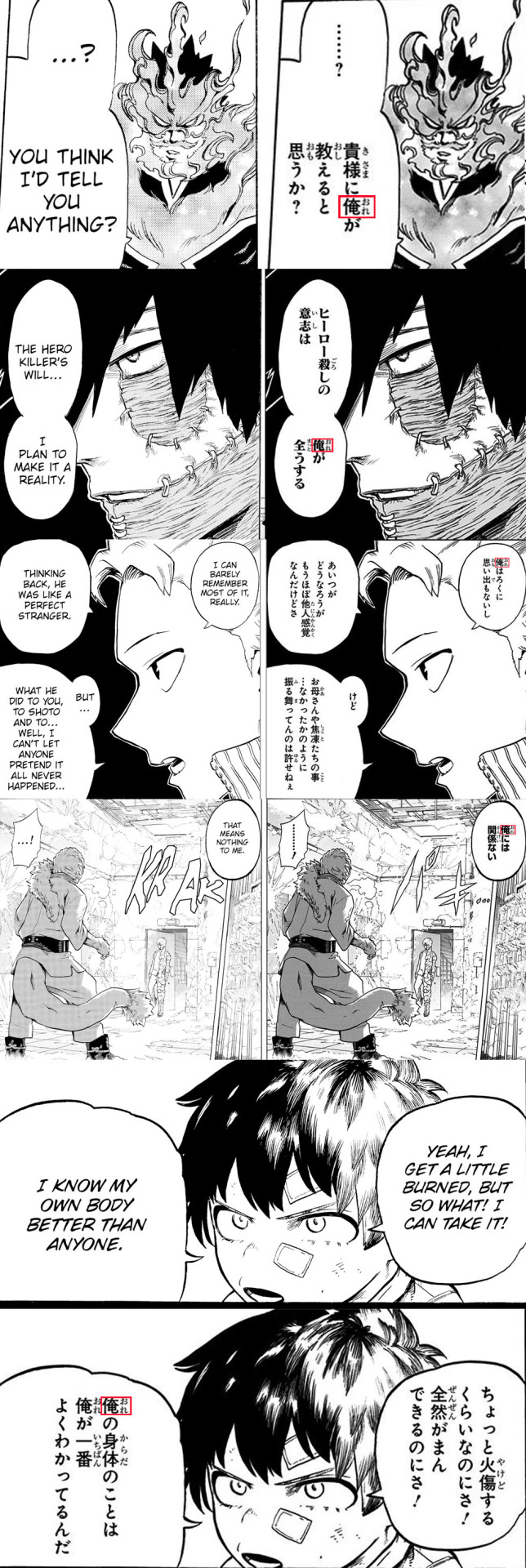
Watashi (私/わたし Lit. “One own person”)
If the male Todorokis use ‘ore’, the female Todorokis use ‘watashi’.
Don’t mistake ‘watashi’ for a female only way to say “I”. Only in casual speech, it is typically only used by women because if used by men in casual context it may be perceived as either stiff or feminine however, in formal or polite contexts, this is gender neutral (for example All Might uses it, his catchphrase “I am here” in Japanese is ‘watashi ga kita’ 私が来た lit. “I have arrived”).
That’s also why in chap 306, when speaking with the press, Enji switches to ‘watashi’ so as to sound as polite/formal as possible (before switching to ‘ore’ again when he tells them to watch him) and, in the anime, they also had him use ‘watashi’ in episode 46 when he answered to the phone so as to convey he was being formal/polite.
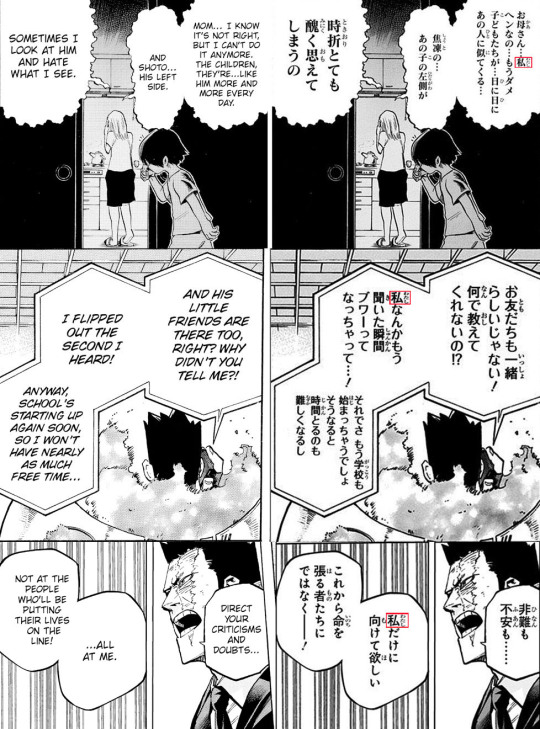
Boku (僕/ぼく Lit. “Servant”)
Used by males of all ages and very often used by boys (for example Midoriya uses ‘boku’ hence the title ‘Boku no Hero Academia’… but All for One also uses it so it’s not just for boys), ‘boku’ is perceived as humble and therefore polite, but can also carry an undertone of feeling young when used by males of older age. In addition to this it’s also used when casually giving deference.
Why I included ‘boku’ in this list if I said all the Todoroki males use ‘ore’?
Well, we actually have some exceptions in which they used ‘boku’.
Differently from Tōya who used ‘ore’ from a very young age, Shōto as a child of 5, used ‘boku’, likely not having the wish to emulate his father’s speech pattern. Interesting enough we know however that Tōya, as an adult, used ‘boku’ when he made his whole speech to the nation which was transmitted during the final stage of the Paranormal Liberation War Arc as, during it, he changed his normally rude speech pattern for one much more polite and humble.
Lastly, although not really a Todoroki but still related to them in a fashion (he’s probably a cousin from Rei’s side since he’s also an Himura), Geten regularly uses ‘boku’.
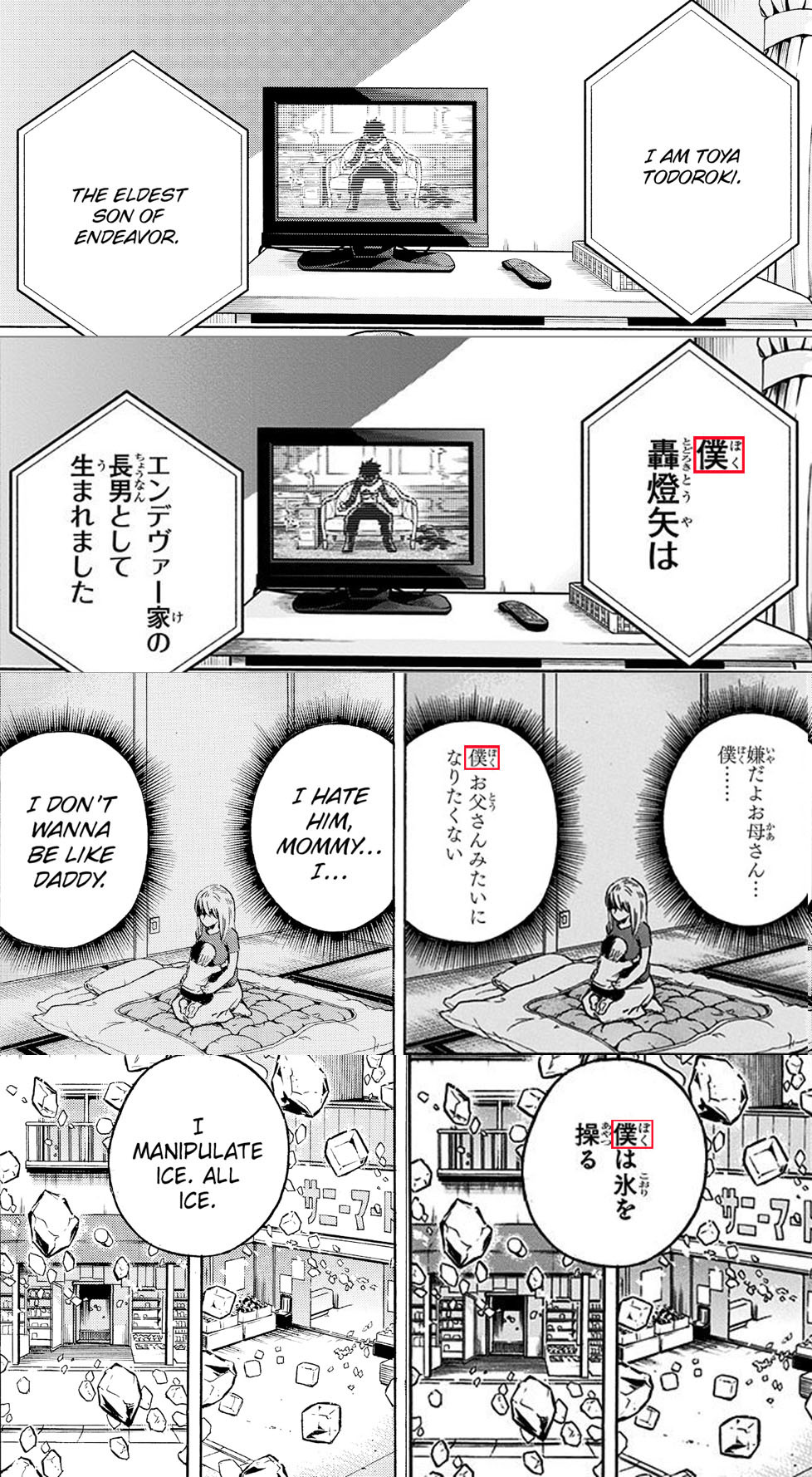
Their own name
Normally used by small children it’s however also a very feminine and kind of childish way to refer to oneself.
Fuyumi, before Natsuo’s birth therefore when she was 3 or younger, used not ‘watashi’ but ‘Fuyumi’ to refer to herself.
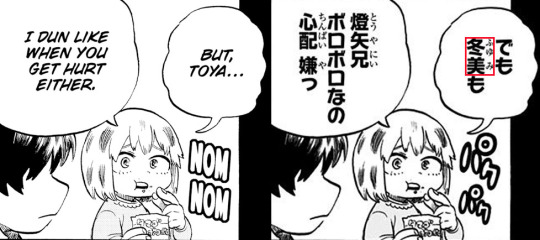
Kono (この “This”) + their own name or personal pronoun
In chap 55 when Enji tells to Gran Torino he will be enough to beat the Nōmu, Enji uses ‘kono Endeavor’ (このエンデヴァー “This Endeavor”). In English this comes out odd and, considering what was said before, you might think it’s either childish or girlish but in this case, with the addition of ‘kono’ the sentence actually remarks the name in a “no one else but Endeavor can do it” way. In the same way in chap 154, when Enji uses this time ‘kono ore’ to tell Hawks if he really believed he was in troubles, it remarks ‘me’ although this time is in the opposite way as to imply “everyone else but him would be in troubles”.
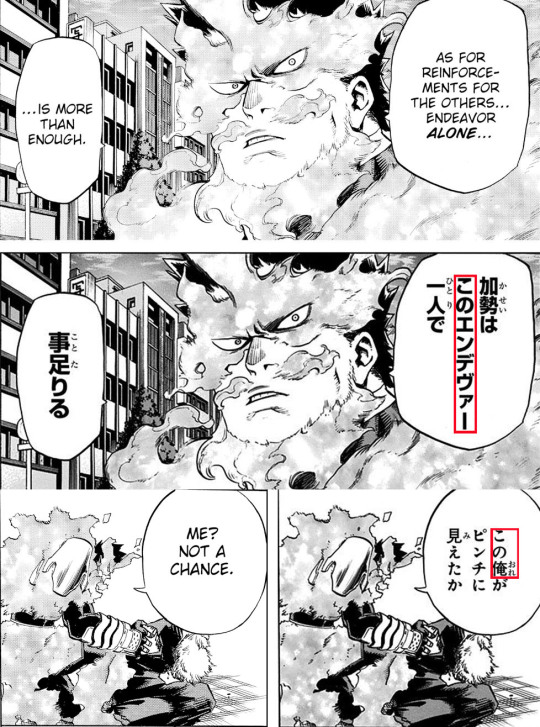
FATHER (父) AND MOTHER (母)
There are various ways in Japanese to say “father” and “mother” that vary for levels of politeness.
Okā-san (お母さん/おかあさん “Mother”)
The addition of the initial ‘o’ (お) and the ‘–san’ (さん) at the end tell us this is a polite way to refer to her, although, since it’s the most common way to call your mother in Japan, even though technically it’s closer to “mother”, it’s perfectly fine to translate it as “mom”, which is currently the most common way to call your mother in English. Note that ‘okā-san’ can also be used to talk about someone else’s mother or for your mother-in-law. Rei is referred as such by all her children, regardless of their age, and even calls herself as such when talking with a young Tōya. Plus this is also how she calls her mother. In the English manga occasionally you also see her called as “mommy” but in Japanese she’s always called ‘okā-san’ only and not in a less formal way (kā-san, okā-chan, kā-chan, mama) and the choice to occasionally translate ‘okā-san’ as “mommy” is likely because the translator felt it would be more fitting for a young child to use it.

Kā-san (お母さん/おかあさん “Mother”)
Same as before but the lack of the initial ‘o’ makes it slightly less polite/formal. It's how Enji calls Rei when talking with Fuyumi. Natsuo will also call Rei as such when telling Enji not to stay close to her and the others or he'll only heat them up further in chap 421. Interesting enough, it's also how Īda calls his mother, even though the English version goes for a more formal "mother".
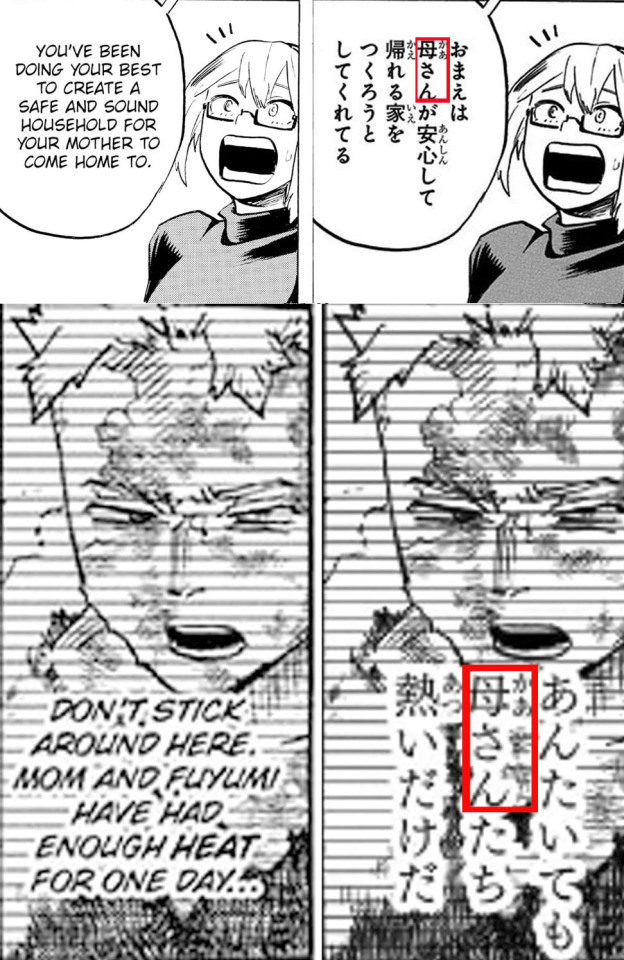
Otō-san (お父さん/おとうさん “Father”)
This is the equivalent to ‘okā-san’ for fathers … but it’s not equally popular as ‘okā-san’ in the Todoroki house. Like ‘okā-san’, 'otō-san' would be closer to "father" but it's okay to translate it "dad" and the English translator occasionally decided to translate it as "daddy" when it was a small child using it. Notably, of all of Enji’s children, only Tōya and Fuyumi still use it, while Shōto, as a child of 5, used it but now doesn’t anymore. Also Rei called Enji as such when talking with a young Tōya.
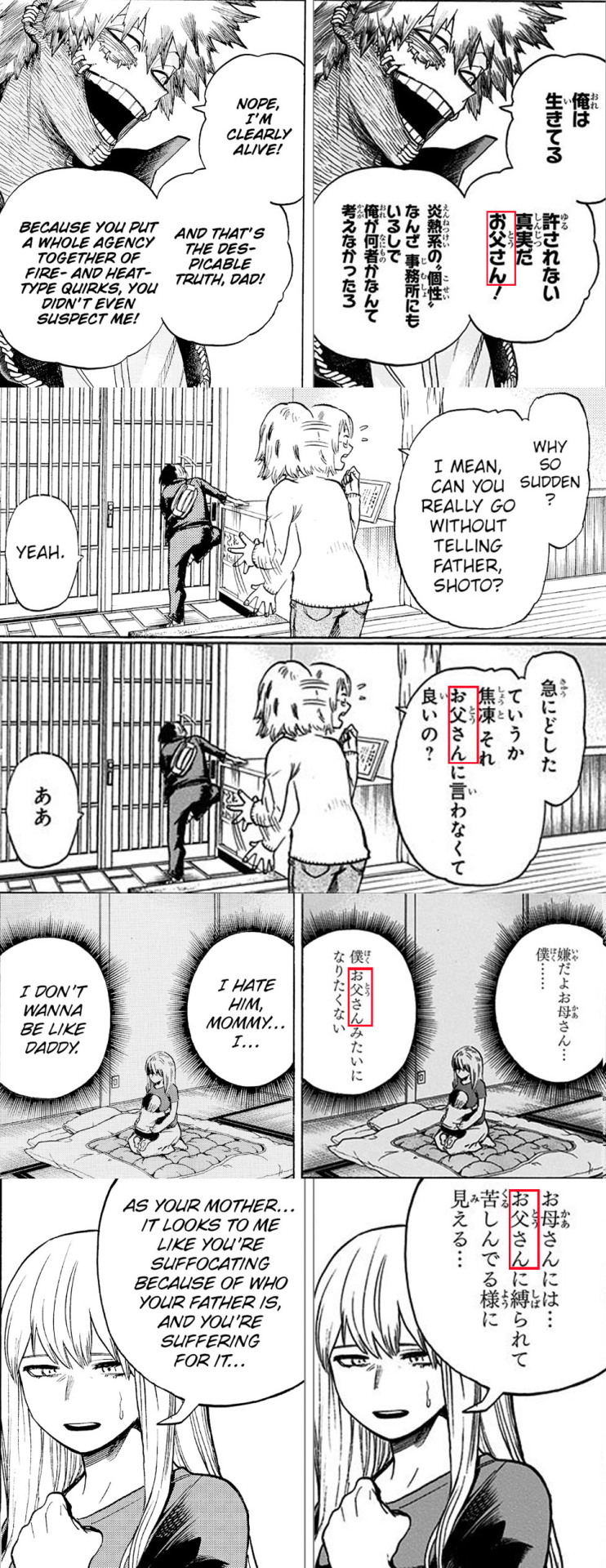
Oyaji (親父/おやじ “Father” or “Old man” lit. “parent father”)
This is a rather nuanced word. Let’s say it’s a more colloquial-sounding way to say “father” which can also used to refer to middle-aged or elderly men. It’s not exactly rude (though some Japanese people consider it as such) but it’s definitely very informal, similar to saying “my old man” in English but (often) without an affection. Again, it's nuanced and depends on the contest. Within one’s own family, teenage and older children, especially males, tend to start using the term to address their fathers at home. In public though, older children will typically call their own fathers ‘otō-san’. Using such word in many cases gives a ‘rough guy’ vibe. Teenager Shōto uses it to talk with or about Enji, regardless he's at home or not, and he’s clearly doing it because he refuse to show him respect, opposite to how he still call Rei ‘Okā-san’ instead than the ‘oyaji’ equivalent, ‘ofukuro’ (お袋). This contrasts sharply with Tōya, who instead regularly uses ‘otō-san’ (though if he does so in a mocking way or as a call back to the past since the past never dies it’s up to speculation) and uses ‘oyaji’ only in a couple of circumstances (chap 301 and 390). In chap 301 he’s clearly trying to keep distance from him as he speaks to himself since he calls him ‘oyaji’ and ‘Todoroki Enji’ instead than his usual ‘otō-san’. In chap 390 he’s being deliberately as rude as possible as he tells him to die. More about it later. It's possible Natsuo would also use 'oyaji' to call Enji, though so far we only saw him either calling him by his Hero name or using 'anta' (あんた) to call him. More about it later.

BIG BROTHER (兄) AND BIG SISTER (姉)
Same as with “father” and “mother” there are various ways in Japanese to say “big brother” and “big sister” that vary for levels of politeness. Note that in theory in a Japanese family the children aren’t all equal but older siblings are hierarchically higher than younger siblings and younger siblings own them respect.
Nē-chan (姉ちゃん)/Nē-san (姉さん)/Onē-chan (お姉ちゃん)
‘Nē’ (姉) is the word used for “big sister”. It can be used alone or after the name of the person in question and the level of politeness changes according to the suffixes and prefixes used. ‘O’ (お “honorable”) gives an extra layer of politeness, '-san' (さん) is your standard polite suffix (when added to a name is generally translated as “Mr.”, “Mrs.”) while –chan (ちゃん) is generally affectionate and expresses closeness and endearment.
Natsuo calls Fuyumi ‘nē-chan’, which is clearly familiar and affectionate, but Shōto calls her ‘nē-san’, therefore sounding more polite and distant. This can reflect the fact that Natsuo grew up closer to Fuyumi and is also closer in age compared to Shōto but might also be a reflection of how they were raised. When Rei told Natsuo to protect his big sister in chap 388, she told him to protect his ‘onē-chan’ (the ‘o’ adds a tone of politeness, but likely Rei always uses it as a way for Rei to remind Natsuo to be polite with his older sister), therefore she might have encouraged him to use a more endearing and close term for his sister, something she might not have done with Shōto merely because he wasn’t allowed to interact with Fuyumi (and the rest of his siblings) when Rei was living with them. In chap 192 Fuyumi calls herself his ‘nē-san’ when talking with Shōto, likely because after Rei left she took up a mother role to him and Shōto might have ended up calling her as such in response. Enji also, when talking with Natsuo, used ‘nē-san’ to talk about Fuyumi and he might have done the same with Shōto so that he ended up doing the same.

Nī (兄)/Nī-chan (兄ちゃん)/Nī-san (兄さん)/Aniki (兄貴)
‘Nī’ (兄) is the word used for “big brother”. The level of politeness changes according to the suffixes and prefixes used, same as ‘Nē’. Now… Tōya is called just ‘Tōya Nī’ by all his siblings and Shōto calls Natsuo ‘Natsu Nī’ as well, no suffixes or prefixes attached. Using just ‘Nī’ it’s very informal and childish but it started likely due to Fuyumi and Tōya being very close in age (11 months of difference) and therefore being allowed to a lower level of formality. Since Shōto was kept apart from his siblings and this lead Rei to stay away from her other children to take care of him as well, Natsuo likely copied Fuyumi’s way to call Tōya and, eventually, Shōto ended up doing the same with both his older brothers despite not being close to them, probably merely because he mimicked the way they talked. Note that when talking to Shōto in chap 34, Enji referred to Tōya as his big brother, he called Tōya his ‘nī-san’. Tōya instead referred to himself as his ‘nī-chan’ twice when talking with Shōto, which could have been mocking but could have also been the way he used to refer to himself with his siblings as a kid. In chap 388 and in chap 244/350 Natsuo and Shōto, when arguing with Tōya drops the childish and familiar ‘nī’, which would be unfitting of the situation, and switch to ‘aniki’ (兄貴). ‘Aniki’ is still a way you can use to call your older brother (‘ani’ is another way to read the kanji for “big brother” (兄) and '-ki' (貴), when added after nouns related to people expresses love and respect) but it’s considered less formal than ‘onī-san’/‘nī-san’, yet not endearing or childish like ‘nī’/‘nī-chan’/‘onī-chan’ as it has a rough note (kind of like ‘oyaji’). It’s notable they don’t use just ‘aniki’ but add a pejorative. Natsuo goes for a ‘KUSO aniki’ (クソ兄貴 “shitty/damn big brother”) while Shōto, who is less close to his big brother, goes for a tamer ‘baka aniki’ (馬鹿兄貴 “stupid older brother”). More about this though, later on.

YOUNGER BROTHERS AND YOUNGER SISTERS
Normally they’re referred just by name, however in Fuyumi and Natsuo’s case they actually have the equivalent of ‘pet names’ of some sort.
Tōya calls Fuyumi ‘Fuyumi-chan’ (冬美ちゃん) and Natsuo ‘Natsu-kun’ (夏くん). As said before ‘-chan’ is generally affectionate and expresses closeness and endearment and, in case it’s attached to the name, is used from older person to younger person. You might want to translate it something like “little Fuyumi” or “dear Fuyumi”. As for Natsuo… ‘-kun’ (君/くん) is usually used for addressing males younger than the speaker. Boys in the same age group can call each other with ‘-kun’ (Midoriya, for example, adds ‘–kun’ to the surname of all his male classmates… while Shōto instead calls them simply by surname). Sometimes male office workers call their younger female colleagues with it. This is not rude but a sign of familiarity. You might want to translate it something like “young Natsu” but just "Natsu" would be fine as well. Interesting enough while Fuyumi calls Natsuo just ‘Natsu’, Rei also calls him ‘Natsu-kun’, Natsuo being the only one among her kids she doesn’t call just with his full name. Shōto is the only one of the younger Todoroki kids who didn't have a suffix attached when called by his older siblings. As said before, being called something different by just your name is not mandatory but it's possible in Shōto's case this is not happening due to him being kept away from them or due to Tōya having been the one who decided the 'pet names' for his younger siblings.
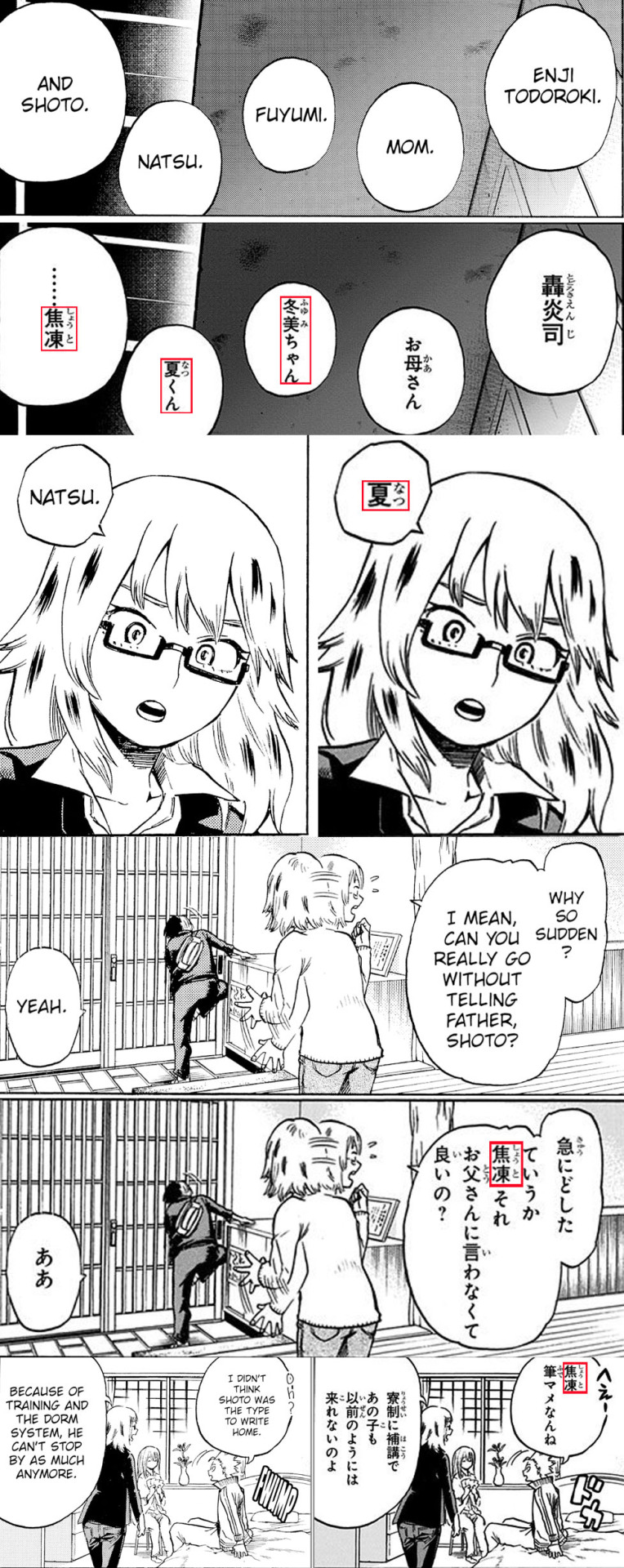
HUSBAND AND WIFE
Again, there are various ways for a husband to call his wife and vice versa.
In Enji’s case though he commonly refers to/calls his wife as just ‘Rei’ and calls her ‘tsuma’ (妻 “wife”) only once, when talking about her and his children in chap 248.
Another common Japanese way to refer to your husband/wife is by calling them "you" (the wife would use ‘anata’ (あなた), the husband would use 'omae' (おまえ)). This often gets translated as "dear" in English manga.
In Rei’s case she usually calls Enji ‘anata’ (あなた), although, for obvious reasons, in the English manga in this case it doesn't get translated as "dear". In Enji's case he occasionally uses 'omae' for her, but since 'Rei' is his default way to call her and 'omae' is his default "you" pronoun for all his family, very likely his 'omae' with her isn't more meaningful than an ordinary "you". More about "you" later on.
Interesting enough in some houses once children are born, the parents start calling each other ‘Otō-san’ and ‘Okā-san’ and when talking with a young Tōya about Enji, Rei called Enji ‘Otō-san’ while Enji, when talking with Fuyumi, calls Rei ‘Kā-san’ but here it was likely done because they were talking with their children about the other parent and not because they are used to call each other in such way.
Interesting enough Nao didn’t use ‘anata’ for her husband but ‘Kotarō-san’.

THE CHILDREN
Enji refers to all his children by first name, while Rei does the same for all her children except Natsuo whom she calls ‘Natsu-kun’.

Both parents, when wanting to talk about their children without saying their name call them either ‘ko’ (子) or ‘kodomo’ (子ども). Both mean child (and can be pluralized) but 'ko’ (子) is a more general term for a child, which is often used in a neutral or formal context (even when the child is actually an adult) while ‘kodomo’ (子ども) is a more specific and inclusive term commonly used to refer to children in a more affectionate or informal way or to emphasize the innocence and vulnerability of children, often used in educational or parenting contexts (and, in the manga, generally used to refer to the Todoroki kids when they were… well, kids). I know I said I wouldn't mention nouns that are too general but, in this case, I’m mentioning all this because, although Enji has no problems in referring to his children as 'ko’ (子) in chap 31, while talking with All Might, Enji referred to Shōto as ‘ko’ (仔) which sounds the same as “child” (子 'ko’) but the kanji he uses is not the usual one for “child” (子) but this one (仔) which means “offspring” and, normally, is used for “young animals/cubs” or “young plants/seedlings”. It’s possible Enji is using it because, when he does, Horikoshi wants us to get the idea Enji is basically talking of how Shōto was breed and raised for the purpose of defeating All Might, as if he were some sort of racehorse, the full sentence being the following:
‘Kore dake oboe toke. ARE ha… izure kisama wo mo koeru HERO ni suru. Sō surubeku… tsukutta ko da’
「これだけ覚えとけ。アレは…いずれ貴様をも越えるヒーローにする。そうするべく………つくった仔だ」
“Just remember this. That one we’re talking about… I’ll make him a hero that will surpass you someday. In order to do that… I had/trained/created that child.”
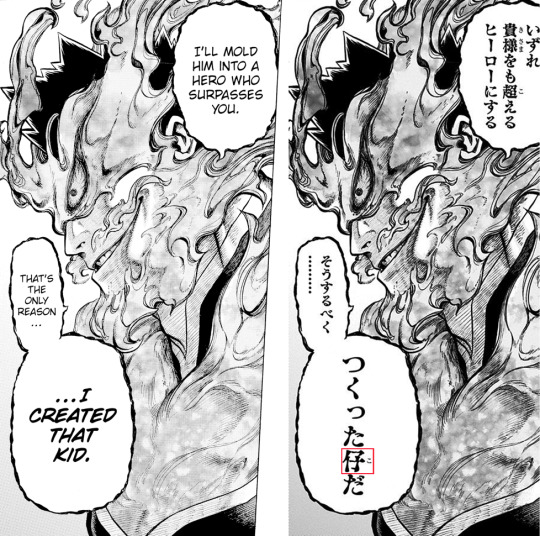
THE GRANPARENTS
In chap 31, when talking about his grandparents Shōto called them ‘haha no shinzoku’ (母の親族 “mother’s relatives”).
'Haha' is the word you use with people outside your group to talk about your mother.
'Shinzoku' (親族) is, under Japanese law, a term that refers to people who we are related to by blood or marriage (you can translate it also as "clan") so yes, it might not necessarily means Rei's parents. It's worth to remember the Himura were an important family with a family head who might not have necessarily be Rei's father (it could have been her grandfather or even her father's male heir), though, due to Geten's story and the scene we saw in chap 301 that in the Himura family the "family head" (当主 ‘tōshu’) was Rei's father.
By the way, the Todorokis instead mention often the 'kazoku' (家族 "family") which is the family unit formed by a married couple and their children.
Shōto might refer in such a formal way to his grandparents either because he's not close to them or because he's talking with Midoriya.
In chap 302 when he refers to his grandparents Tōya called them ‘Obā-chan-tachi’ (おばあちゃん達 “grandma and the others”).
The ‘o’ (お “honorable”) in 'obā-chan' gives an extra layer of politeness while '–chan' (ちゃん) is generally affectionate and expresses closeness and endearment. By using '-chan' and singling out his grandmother (who unlikely was the family head) instead than his grandfather Tōya sounds close to her.
It's possible though his grandfather died when he was younger, hence he referred to his grandmother.
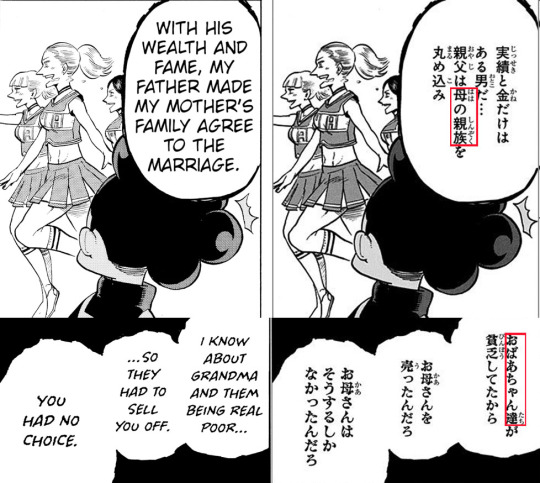
For more about the Himura you might want to read my post about the Himura family.
WHO WORKS FOR THE TODOROKIS
In chap 302 Enji says he’ll hire more ‘shiyōnin’ (使用人 “servant/employee”).
In chap 249 Natsuo calls the person who used to cook for them ‘otetsuta’ (お手伝 “helper/maid”).
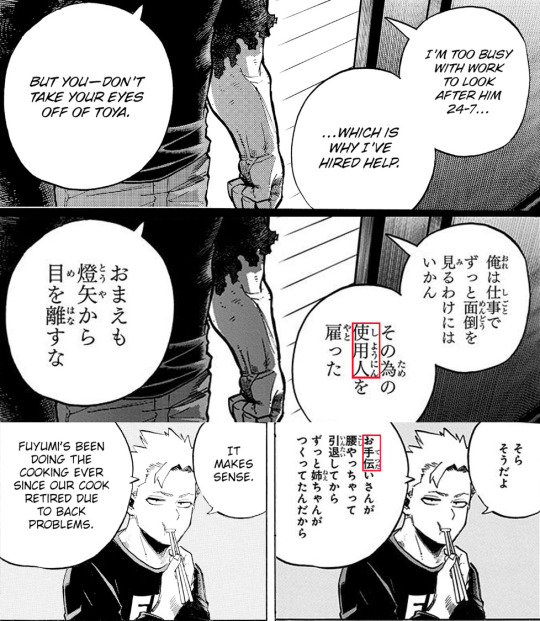
Enji, in his role as Hero, has also an 'untenshu' (運転手 "driver"), Kurumada Untenmaru, but we don't know how Enji or the other Todorokis call him, just that Kurumada calls Enji 'Endeavor' (and 'No.1' in the OAV) and uses 'anta' (あんた) with him (more about 'anta' later on), while he calls 'jarinko' (ジャリンコ) Shōto, Midoriya and Bakugō.
'Jarinko' (ジャリンコ/じゃりんこ/じゃりん子/砂利子) is an old fashioned word used to call a "student who can't keep up in school" but it's also used to say just "brat".

In theory, more than to the Todoroki family, Kurumada is connected to the Hero world, but since, according to his profile, he knows Enji by a looong time (and is one year older than him) I thought to include him as well.
HEROES AND VILLAINS
In Enji, Tōya and Shōto’s case, in addition to their own name they also have their Hero/Villain monikers, 'Endeavor' (エンデヴァー), 'Dabi' (荼毘 "cremation") and 'Shōto' (ショート yes, same as his name but written in katakana instead than kanji)… plus Enji also is defined by his ranking (‘No.2’ first, ‘No.1’ after). In some circumstances the family uses such names instead than the usual way they call them.
Interesting enough though, when Shōto interns under Enji, Enji calls him with his Hero name (which is still 'Shōto' but written in katakana so you can’t really notice it in the anime but it’s visible in the manga) and of course he called Tōya 'Dabi' until he discovered he was his son. After that moment he always called him just Tōya and I couldn’t find an instance in which he called him ‘Dabi’ again.
In fact, even after waking up in the hospital, Enji wants to say Endeavor is dead since he can’t kill a ‘Tairyō satsujin-sha’ (大量殺人者 “mass murderer”) (aka Tōya) but what he voices is instead he can’t kill his ‘musuko’ (むすこ) which means “son” (息子) and, when he finally fights Tōya, he ends up seeing him as the kid he was... making him unable to make a distinction between Tōya and Dabi. Once he acknowledges that Dabi IS indeed Tōya, he won't be able to go back see him as Dabi or call him as such, differently from others of his family members.
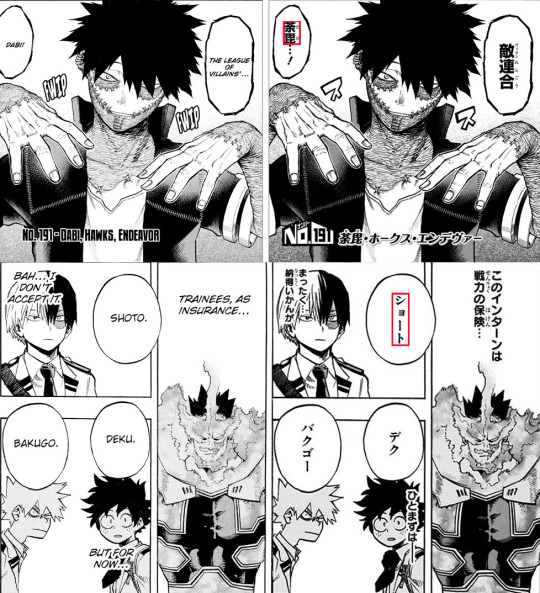
We never see Rei calling Enji 'Endeavor' but we see her calling Tōya 'Dabi' once, when she tells her husband he must fight him (during the rest of the discussion she called him 'Tōya' or 'ano ko' (あの子 “that child”))... as calling him 'Dabi' probably helps her to distance herself from how she's asking Enji to fight their son (Chap 302).

Natsuo called his father 'Endeavor' in chap 249, during the dinner at which Midoriya and Bakugō were invited. This seems to remark his wish not to acknowledge Enji as his father but as a stranger.
Natsuo also refers to his brother as 'Dabi' in chap 302, but more as something that was created more than as his brother, as he's also likely trying to distance himself from the idea Tōya and Dabi are one and the same.
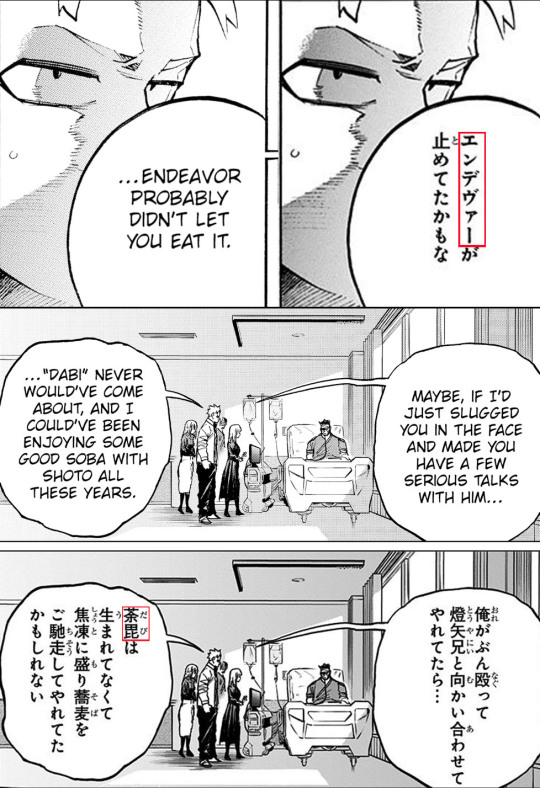
At the same time Shōto called his father 'Endeavor' during the Stain case when asking to other Heroes about him (chap 55) and during his internship (chap 249), in short when he needed to acknowledge him as a Hero.
As for Tōya, of course Shōto called him 'Dabi' before the reveal. After the reveal, in chap 349 Shōto, before fighting Tōya, starts calling his brother just ‘Tōya’ (without the ‘nī’ (兄) which is kind of rude) then decides to switch to ‘Dabi’, either to acknowledge him as a Villain or to keep emotional distance from him. We know also that in the flashback in chap 352 called 'Dabi' his family's sin.

Tōya isn’t really prone to call Enji 'Endeavor' and does so only in few notable situations:
- prior to becoming Dabi, solely when telling Enji to look at him before attacking Shōto as a child (chap 301);
- when facing Enji as Dabi after Enji’s fight with the Nōmu (chap 190);
- when denouncing Enji on tv (Chap 290);
- during the Paranormal Liberation War when he attacked him (chap 292)... although during the battle he alternated calling him 'Endeavor' and 'otō-san';
- when he repeated what Skeptic told him, that Endeavor was at Gunga... but what's meaningful here is that the reading for 'Endeavor' is given as 'otō-san' (chap 374).
This seems to imply Tōya uses 'Endeavor' solely when he's talking to/about/him in his role as a Hero.
On the other side Tōya never calls Shōto with his Hero name… even though, of course, since it matches with his normal name, no one can realize it.
Now... I said the family tries to distance the idea that Tōya IS Dabi by calling him Dabi... but credits when it's due, Tōya himself said that Tōya died and Dabi was born so he too is keeping the two identities parted in a way... albeith he has no problems to refer himself as 'Tōya' and be called as such, both by his family and by Himeko, who switches on calling him from 'Dabi-kun' to 'Tōya-kun', so more than identities, we should probably say he means the person he once was 'died', as he started aiming for different things and behaving differently.

Not quite Todorokis but still related to them, in chap 301 the Himura family head who’s likely Rei’s father, called Enji ‘Endeavor-sama’ (エンデヴァー様) and ‘Top Hero-Sama’ (トップヒーロー様) instead than using his civilian name.
'-sama' (様/さま) is much more formal and polite than just '-san', to the point it’s sometimes translated as “lord”/”lady”.
The fact that the Himura family head is using it underlines how high he thinks of Endeavor, for being such an important Hero.
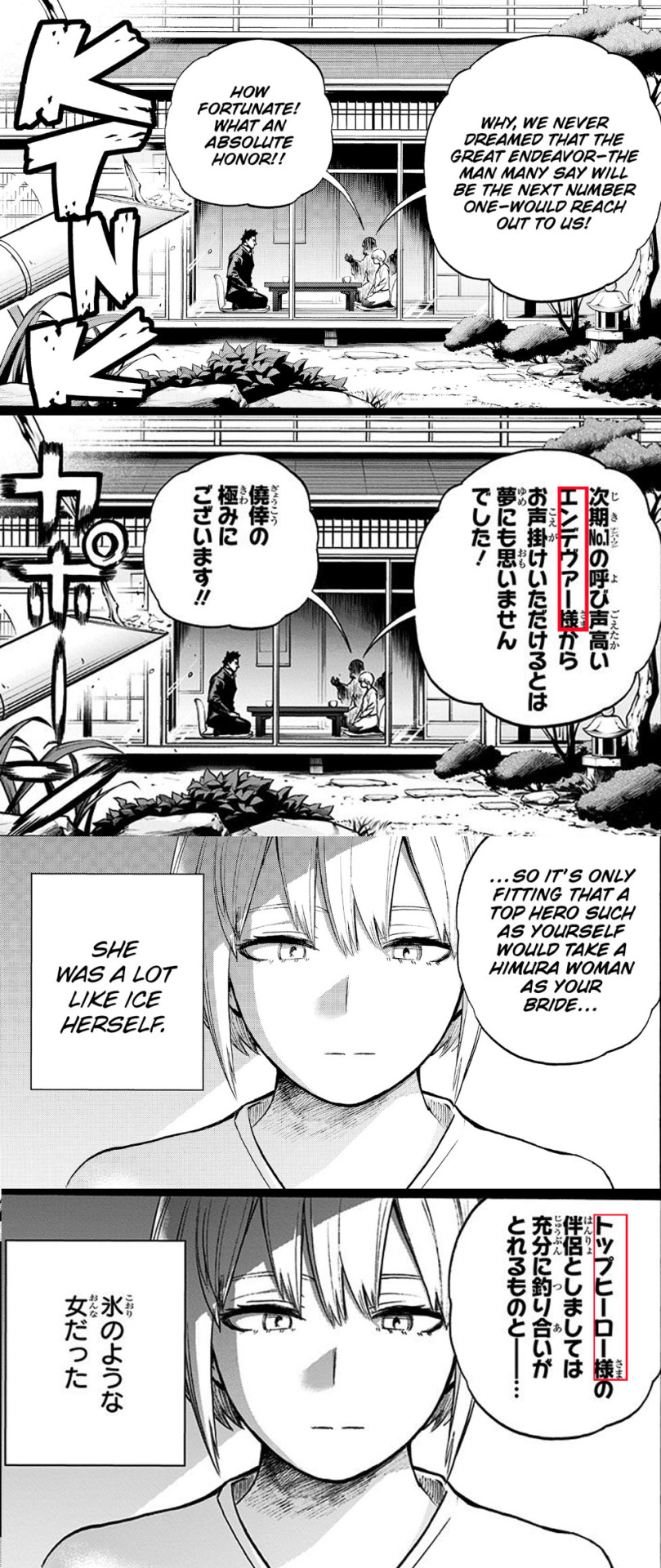
Enji also gets called 'No.2' and then 'No. 1' after he rises to the position. Shōto in chap 31, calls him 'mannen No. 2 no HERO' (万年No.2のヒーロー "eternal No. 2 Hero"). Then after he becomes No.1 Natsuo refers to him as such in chap 192, Shōto does so in chap 247, and Tōya does so in chap 191 and 231. In chap 191 Tōya also called him ‘No. 1 hero-san’ (No.1ヒーローさん), when telling him goodbye and that they’ll have a chance to talk again... though the politeness here is probably an attempt at sarcasm.
In chap 290 Enji himself defined himself ‘kono kuni no Top Hero’ (この国のトップヒーロー “this country Top Hero”).
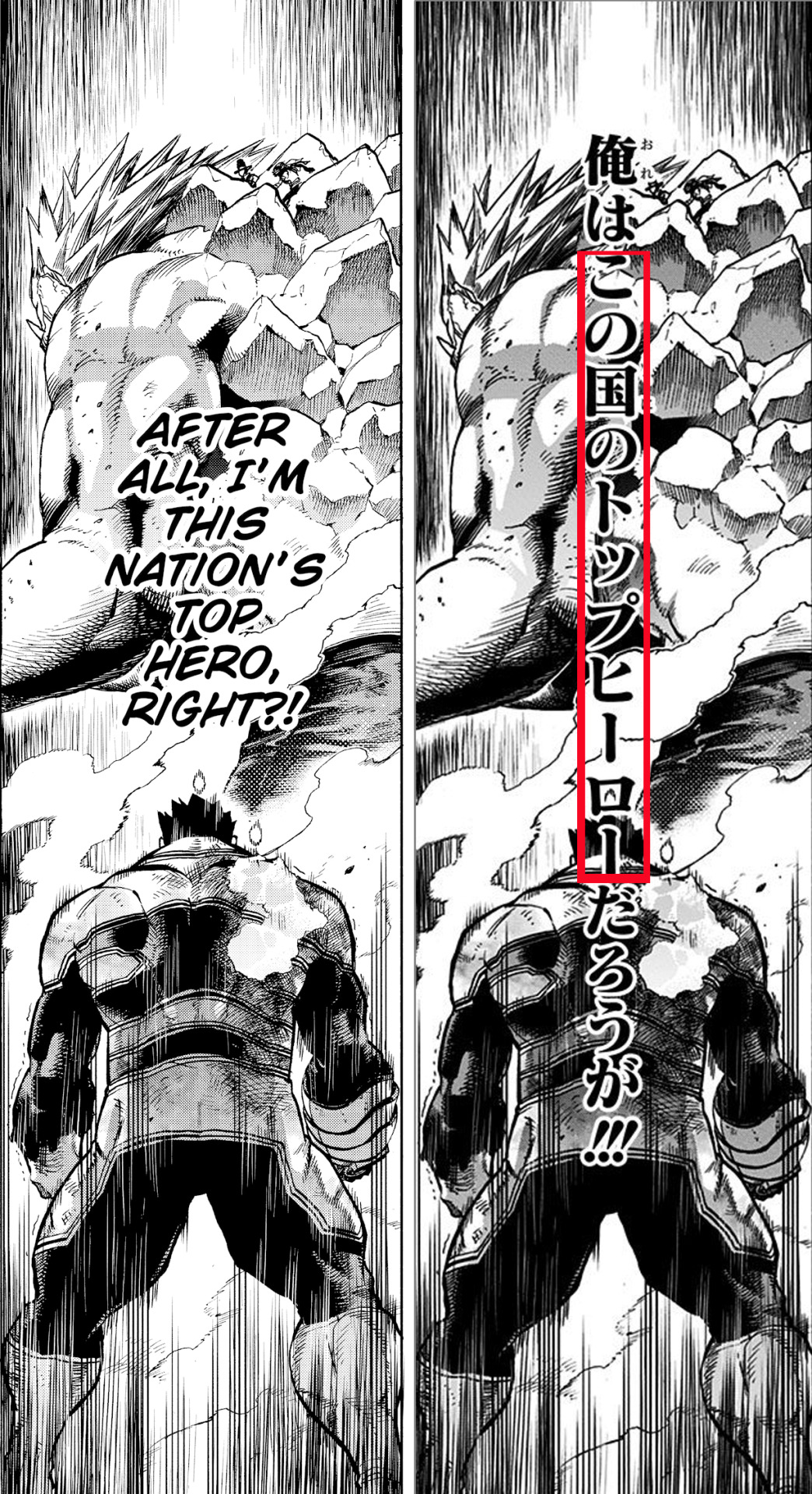
Also I’m placing it here, though I doubt Rei is referring to his Hero role but to how Shōto managed to positively react to all he went through (differently from the rest of the family so he's kind of like a role model to them)… still in chap 302 Rei says Shōto is the ‘Todoroki-ke no HERO’ (轟家のヒーロー “Todoroki’s family Hero”) but the reading given is ‘Uchi no HERO’ (ウチ のヒーロー “our own family’s hero”).
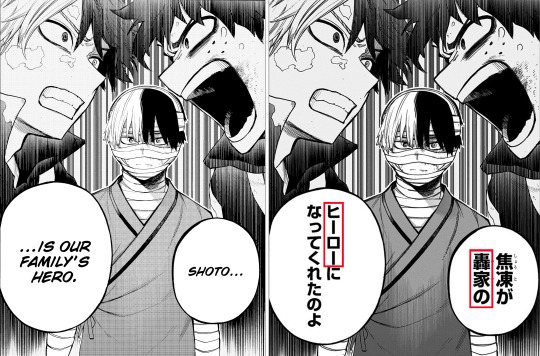
YOU
Polite Japanese speech requires not the use of “you” but the use of a person’s name. However the Todorokis are a family, they talk to each other in an informal way and so they do use also “you” to talk with each other.
Anata (あなた,貴方, 貴男, 貴女 Lit. “precious toward”)
This is the only second person pronoun comparable to English “you”, yet still not used as often in this universal way by native speakers, as it can be considered having a condescending undertone, especially towards superiors. For expressing “you” in formal contexts, using the person’s name with an honorific is more typical (Hawks tends to use 'Endeavor-san' when talking with Enji and switches to 'anata' only when he doesn't want to repeat 'Endeavor-san'.... and while she uses just 'Endeavor' or 'Hawks', when she has to say "you" the Chairman of the Hero Public Safety Committee uses 'anata' as well). More commonly, ‘anata’ may be used when having no information about the addressed person; also often used as “you” in commercials, when not referring to a particular person. Furthermore, commonly used by women to address their husband or lover, in a way roughly equivalent to the English “dear”. Rei uses always ‘anata’ to talk with Enji but, of course, due to their (poor) relation, we never see it as being translated as “dear” in the English manga.
Omae (おまえ/お前/御前 Lit. “polite front”)
This is the “you” everyone in the Todoroki family uses. Of course it comes with a nuance. If used to talk with people outside the family it’s used by men with more frequency and expresses the speaker’s higher status or age, or a very casual relationship among peers. Often used with ‘ore’ it can be very rude if said to elders. Commonly used by men to address their wife or lover, paralleling the female use of ‘anata’. Of course, since the Todorokis are a family, they use it with each other and it’s not meant to be rude (and yes, occasionally Enji used it with Rei though it’s not as recurring as she uses ‘anata’ so it might not have the same nuance)… and since the male Todorokis are rough, tough males who use ‘ore’ they also use it with people that’s outside the family but in this case it’s actually kind of rude (notable how Geten for example uses it with Dabi during their fight).
Anta (あんた/アンタ)
Contraction of ‘anata’ is also generally not used as it’s considered too direct. Can express contempt, anger or familiarity towards a person. Sometimes it can be felt as more rude than ‘omae’ sometimes it’s the opposite. Generally seen as rude or uneducated when used in formal contexts. ‘Anta’ is often used among girls who want to act leading the guy a little bit forcely and scoldishly. There are a bunch of time in which ‘anta’ is used among the Todoroki family members and they’re all when a character is scolding another. We start with Fuyumi who, when scolding Natsuo in chap 187, calls him ‘anta’ (あんた), we continue with Natsuo who, when arguing/scolding Enji in chap 192 and 302 calls him ‘anta’ (あんた) and we finish with Shōto who, when arguing with Enji in chap 351 about who of them has to face Tōya calls him ‘anta’ (アンタ) to tell him he’s the only one who can face All for One. Yes, Shōto uses katakana which generally are used to underline the word, so it's possible it's done to remark how only Enji can do it but also to underline how Shōto, who's angry, is not using his usual ‘TemeE’ (てめエ) with his father but a tamer word. Interesting enough Tōya, or probably I should say in this case Dabi, uses ‘anta’ too, but not with his family member but with Ujiko in chap 350 both to refer just to him and to him and All for One ‘anta-ra’ (あんたら “you” (plural)). Dabi is an ‘omae’ guy who’s generally not polite but calls Ujiko ‘Ujiko-san’, so the fact for him he uses ‘anta’ and not ‘omae’ is probably meant to feel less rude that if he were to use ‘omae’. Another character connected to the Todoroki family who uses ‘anta’ is, as I've already said, Kurumada with Endeavor.
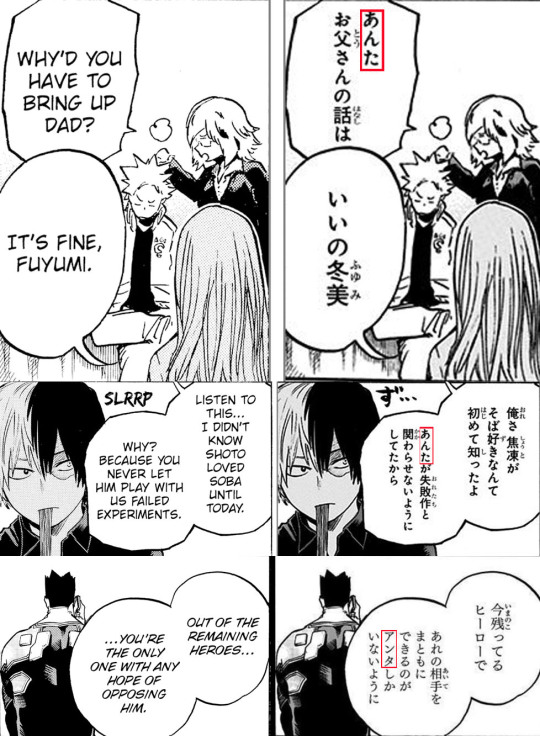
Temē/TemeE (てめえ/てめエ/手前 Lit. “the one in front of my hand”)
'Temē', a reduction of 'temae', is, according to some, the rudest way to say “you” even more rude than ‘Kisama’ (we’ll talk about it in a while) and it’s used when the speaker is very angry. It’s the sort of thing you might translate with “son of a b*tch” or some other insult along the line. Originally used for a humble first person, it’s an ateji, which means either the readings of the individual kanji do not match the reading of the word, or the meanings of the individual kanji do not match the meaning of the word. Shōto uses ‘temeE’ (てめエ) in chap 34 when arguing with Enji (which makes notable how he’ll only use ‘anta’ much later on when arguing with him in chap 351) and again uses ‘temeE’ (てめエ) in chap 292 when fighting with Tōya and Tōya also uses ‘temeE’ (てめエ) in chap 351 when fighting with Shōto (in their previous fight he used ‘omae’ with him). The fact that the last ‘e’ is written in katakana instead than hiragana is often done to put emphasis on it.
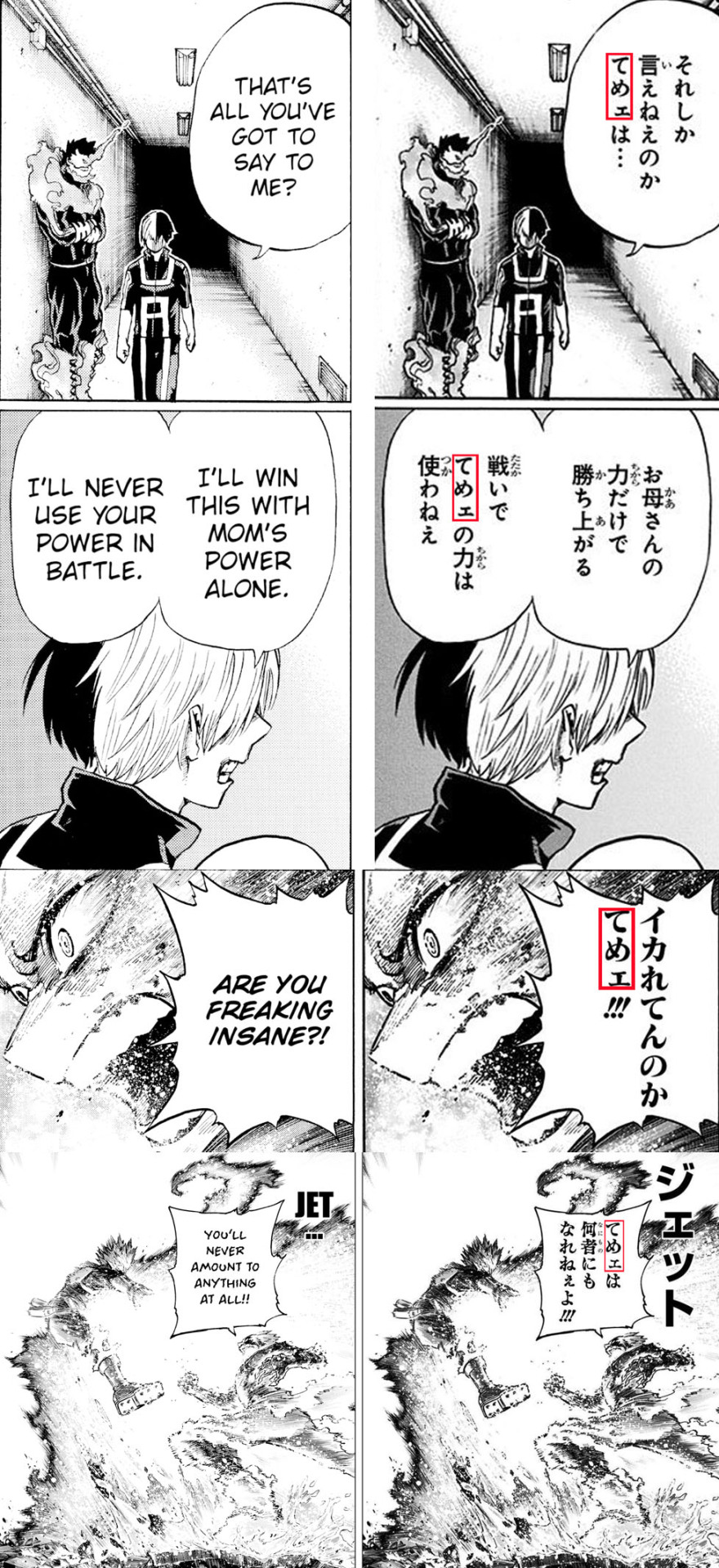
For completeness sake I’ll report two other ways to say ‘you’ which some of the Todorokis use but not, as far as we know, with their family members.
Kimi (君/きみ Lit. “lord” (archaic))
It’s the kanji also used to write '-kun'. Informal to subordinates; can also be affectionate; formerly very polite. Among peers typically used with ‘boku’ (僕) (so, as you can easily guess it’s Midoriya’s “you” when he’s not using someone’s name). Often seen as rude or assuming when used with superiors, elders or strangers. Enji uses it when talking with Midoriya at the sport festival and when he observes how Midoriya too was one of them because he should have suffered for his Quirk, showing him some degree of politeness… but he will eventually switch on using ‘omae’ for him during the Dark Hero arc, which likely his meant to imply they gotten more familiar, not that he's being disrespectful.
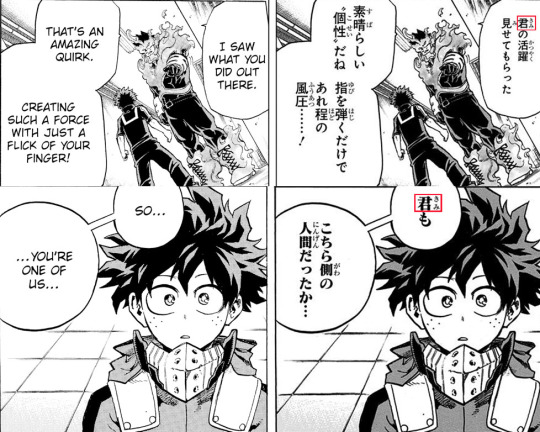
Kisama (貴様/きさま Lit. "precious lord")
Historically very formal, but has developed in an ironic sense to show the speaker’s extreme hostility/outrage towards the addressee. It’s basically so rude/aggressive it often gets translated into “bastard/you bastard”. Enji uses it when talking with All Might, sometimes outright saying ‘kisama’, sometimes the furigana say ‘All Might’ but the kanji below say ‘kisama’ just to drive home the way Enji is saying ‘All Might’ is all but polite and all this is very rude as All Might isn’t just ranked above him but he’s older than him and a Hero by longer time so he definitely deserves more respect. Enji also calls ‘kisama-ra’ (it’s a plural form of ‘kisama’) Midoriya and Bakugō when they intern under him. This is actually interesting. He starts with ‘omae-tachi’ (it’s a plural form of ‘omae’) when he says he’ll supervise them, then switches to ‘kisama-ra’ when he tells Bakugō and Midoriya to tell him about themselves, then he moves to ‘kimi’ when he says since Midoriya too suffered for his Quirk he’s one of them… to go back to ‘kisama’ when he address Bakugō only… to switch again to ‘omae-tachi’ when he’s addressing the three of them… to go back to ‘kisama-ra’ when he tells them they’ve to gain experience working under him and uses ‘kisama-ra’ again when he tells Bakugō and Shōto he’ll give them the same assignment and also uses it to tell the three of them won’t impact on his work. Long story short, very likely that ‘kisama’ is solely meant to remark how they’re working under him. He also uses ‘kisama’ when he begins interacting with Hawks (who instead, as said before, uses 'Endeavor–san' and when he has to use “you” with him goes for ‘anata’ despite Hawks being an ‘ore’ guy), only to switch to ‘omae’ later on.

CONTINUE IN THE NEXT PART!
#boku no hero academia#Todoroki Shouto#Todoroki Touya#Todoroki Enji#Todoroki Natsuo#Todoroki Fuyumi#Todoroki Rei
91 notes
·
View notes
Text
Zettai BL Ni Naru Sekai VS Zettai BL Ni Naritakunai Otoko 2024 - Episode 4 Eng Sub

VS SOCIAL EXPECTATIONS and VS SCHOOL FESTIVAL
For downloading instructions and where to find the raw files, please check our masterpost.
[Subs link]
We ask that you not upload our subs to streaming sites.
Sharing with friends is fine. We’re also OK with folks sharing them in other ways as long as they aren’t public. Please use discretion when talking about the fansub outside of tumblr, but don’t hesitate to get the word out in other ways, and feel free to promote it here. Please credit ikeoji-subs whenever possible—we put a lot of time and effort into this.
Feel free to use the fansub for fandom purposes. Gif-making, meta-writing, and other fandom-related creative endeavors made using our fansub are not only welcome but encouraged.
We'd like to thank everyone who has left messages in the tags and elsewhere who've had nice things to say about the fansub. We'd particularly like to thank @respectthepetty for some especially kind praise. Every word of encouragement is deeply appreciated!
And big thanks to @my-rose-tinted-glasses for gifs! We’re so lucky to be able to benefit from your skills.
translation notes:
about “konpuraiansu” (4:28)
This was a tricky situation because Japanese uses an English loan word, compliance/konpurainsu, in a way that has a really different connotation from the way that word is usually used in English. It usually makes sense to translate Japanese words that are loan words from English as the same English word in a subtitle. But in this case, it didn’t really mean the same thing.
Personally, when I think of the meaning of “compliance,” I think about bureaucratic systems of rules. Before grad school, I worked for a number of years in admin positions at a large university. Every year we would have to do “compliance training,” which mostly involved reading interminable powerpoint presentations and answering quiz questions about them. They were about things like using a strong password or not accepting gifts worth more than a certain amount of money. Not exactly the same type of thing Mob alludes to here.
From what I gather, in Japanese “compliance” means something more like acting in accordance with social mores. English really doesn’t have a word that gets this idea across, as far as I’m aware. Thankfully, we do have a number of ways of talking about social norms.
Another factor that complicated the task of translating Mob’s observation about contemporary teenagers is that the literal translation was that they are “too conscious of compliance.” This also wouldn’t be a typical way to use “conscious” in English. So I ran some replacement word options past Snow that described various ways in which a person might be too aware of or focused on something, and we landed on “preoccupied.” The line then became, “Aren’t high schoolers these days too preoccupied with social expectations?” (Correspondingly, the title of the segment became "Vs Social Expectations.")
In my conversation with Snow about this line, I also learned about some cultural context for this line that I hadn’t been aware of before. She explained that it was related to the Japanese word seishun, which basically means “the spring of youth.” Apparently, the literal meaning is “blue spring.” Part of the idea of seishun is that when you’re young, you can act in an impulsive, passionate way that flouts societal rules because you aren’t as aware of the rules and/or as concerned with the approval of others as a proper adult would be. Thus, if adolescents are excessively worried about adhering to social norms, it’s like they’re wasting the opportunity to enjoy a kind of freedom that won’t be available to them later in life.
This theme continues when Mob chases after Hatano and his parents see them running from below. Not recognizing Mob, his mother comments on the “energetic young men” they see. When they each mention “the spring of youth” (starting at the 5:46 mark), they’re saying “seishun.”–Towel
about “when I’m 20” (4:39)

You might think, from this line, that Hatano is saying he’ll confess to Mob again when he’s 20 because that’s when they’ll be legally able to date. That’s what I presumed when I first heard it. But there’s actually no legal reason why Mob couldn’t date Hatano if he wanted to. Hatano’s dramatic daydream about Mob being handcuffed in a jail cell aside, it’s actually not illegal for someone in their early 20s–or any adult, for that matter–to date or have sex with a 17-year-old in Japan. Actually, when I looked up age of consent laws in Japan I was surprised to learn that the age of consent was only raised to 16 a year ago and that prior to that, it was 13! But of course, laws are one thing and social norms are another. If Hatano wants to date Mob openly without fear of being judged, criticized, or snubbed–or, perhaps more importantly, without fear of inflicting that sort of treatment on his beloved Mob–he’ll have to wait until he’s an adult in a social sense. Snow explained to me that traditionally, this happens when a person turns 20. Apparently 20 was also the legal age of adulthood for a long time, and it remains in place for some purposes (for example, the legal drinking age in Japan is 20). But even though many laws have changed, the idea that 20 is the age when someone becomes an adult in a social sense remains.–Towel
about “if I keep on believing” (9:09)
Here’s a little Easter egg. I was finalizing the lines Haruhiko speaks here when I noticed something–they were already very close to the lyrics of a song from the Disney movie version of Cinderella called “A Dream Is a Wish Your Heart Makes.” I haven’t seen Disney’s Cinderella very many times, but my sister sang this song at a school recital in fourth grade, so the lyrics got burned into my brain. The part in question goes like this:
No matter how your heart is grieving
If you keep on believing
The dream that you wish will come true
This part of Haruhiko’s dialogue was already really close to these lyrics, so I exchanged a few words (no change to the meaning, just switching out synonyms) to get it even closer. Here’s what his lines look like if I arrange them to match up with the song lyrics:
No matter how sad I feel now
If I keep on believing
My dream will definitely come true someday
Not the same, but kind of a remarkable resemblance, all things considered.–Towel
blackboard writing (16:44 and 18:20)
At a couple of points during the scene in Mob's university classroom, there's writing on the blackboard at the front of the room. Snow translated what was written there, but there was no way to fit that translation in the subtitles. The information given there wasn't so crucial that this posed a big problem. But it's interesting enough to be worth including here.
At 16:44, the writing on the blackboard says:
School festival play:
Momotaro
Cinderella - 26 votes
King Lear
Yotsuya Kaidan
Prison Break - 1 vote
101 Dalmatians
Toyama no Kin san
Planet of the Apes
24 - 1 vote
This is clearly a list of ideas for what story to base the class play on, along with the number of votes each idea received.
At 18:20, it says:
Cinderella:
Cinderella
Prince - Ouji
Stepmother
Stepsister 1
Stepsister 2
This is clearly a list of roles, only one of which has been assigned so far--the role of the Prince, given to Ouji.
about Mob’s horse sounds (19:24)
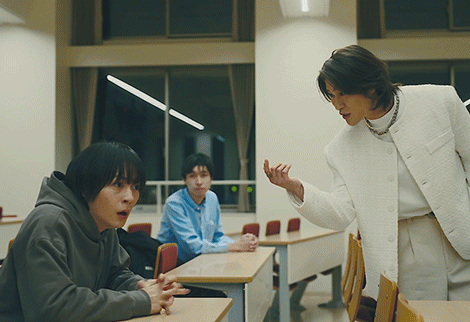
This might be a bit excessive, and it’s certainly an example of my perfectionism. But when I got to the part of this episode where Mob starts making horse sounds, it didn’t seem sufficient to just caption it “horse sounds.” I knew there were some specific terms for the sounds horses make, and I had heard of some of them, but I didn’t know their exact meanings. I went looking around for resources and finally found a really good youtube video that explained a bunch of different noises horses make and what they mean. In the end, the only new term I needed was “nickering.” When he’s not neighing or saying “gallop gallop,” Mob is nickering. The person who made the horse sounds video had an amazing quote about this type of horse sound–they described nickering as “a melodic symphony in the equine lexicon.” I’m guessing that other people watching the show with our subtitles mostly won’t already know the exact meaning of “nickering” either, so maybe I shouldn’t have bothered. But I like getting the specifics of things right. And who knows, maybe a horse enthusiast or two will watch this and appreciate the accuracy.–Towel
If you'd like to hear some examples of real horses nickering, or hear the narrator of this video wax rhapsodic about horse vocalizations, here's the video I mentioned:
youtube
Tag list: @absolutebl @bengiyo @c1nto @come-back-serotonin @lurkingshan @my-rose-tinted-glasses @porridgefeast @sorry-bonebag @twig-tea @wen-kexing-apologist
#zettai bl#zettai bl 3#zettai bl season 3#zettai bl 2024#zettai bl ni naru sekai vs zettai bl ni naritakunai otoko#a man who defies the world of bl#absolute bl#translation notes
60 notes
·
View notes
Text
Sherlock & Co - Mailbag Episode 4 Transcript
00:00-00:29 *Intro Music*
00:28 John: Hello there, Mister Flatmate.
00:31 Sherlock (Resigned): What is it and why have you got your laptop?
00:34 John: It’s that time! My fine fellow-
00:34 Sherlock: For goodness sake. *sounds of him moving on furniture*
00:36 John: Oi, where you going?
00:38 Sherlock: I’m getting my cushion.
00:39 John: Your cushion?
00:40 Sherlock: Yes. Here. This one.
00:42 John: That- that’s Mariana’s.
00:45 Sherlock: Ah, it’s mine.
00:46 John: I know it’s her’s. I bought it for her for Christmas.
00:50 Sherlock: Are you sure?
00:51 John: Yes, because you don’t support Real Sociedad and she does.
00:56 Sherlock: *pause* I could.
00:57 John: Yeah, you could, but you don’t. Ok- *gibbers* It doesn’t matter. Just sit on the bloody cushion. Fine. Qs! And indeed As! Here we go. Uh, ahem, mm, just a disclaimer here, to the patrons. Um. I’m old. Uh, I’m thirty-four. If-if I see a question in the Discord, I-I just ask it. Uh, if it’s in the wrong order or i-if I’ve missed some out. It’s-it’s probably just me not seeing it. So, y’know. Right-o! Uh-Ooo! Off to a flyer here! Milque asks, “Favorite tube line?”
01:29 Sherlock: Victoria.
01:30 Yeah, Victoria. Yeah, yeah. Generally, most Londoners will give that answer. Umm, y’know clean trains, not too many stops, and some big stations on there. Y’know King’s Cross, Euston, Oxford Circus, um Victoria, obviously. Um, some other lines worth mention: Bakerloo brings a certain vibe. B-bit of a sort of kooky, deranged, but pleasant elderly uncle that doesn’t wash kind of vibe. Uh, central line is possibly the most hated, ah, especially during the summer. Um, Piccadilly gets a lot of people headed to Heathrow, so it comes with a lot of baggage. Hah! Literally clambering over suitcases on that one. The Elizabeth line is amazing, but seems to be closed or delayed most of the time. Um, so thanks for listening to TubeCast!
02:20 John: Heh, right. Next question! SaraHawke722 asks, “How do you both know Stamford?” Stamo! The Stamster! I think therefore I Stam. Heh, uh, I-I added those bits. They didn’t say that. Uh, right. Sherlock you go first.
02:36 Sherlock: I met him at St. Bart’s.
02:39 John: That’s uh Saint Bartholemew’s Hospital in London
02:42 Sherlock: I know.
02:43 John: Yes, I know, I’m just telling the listener.
02:45 Sherlock: *pause* Right… I met him at St. Bart’s. There was a study on skin grafting that he was undertaking. I initially made a number of enquiries about the study, he then hired me to work with him on it. Then after that he wanted me on other projects that I didn’t find that interesting, but *with emphasis* he did let me use the lab.
03:03 John: Great, uh ok, um, I met Stamo in Freshes week at University. Um, the University of London. W-which is kind of affiliated with UCL and King’s College London.
03:15 Sherlock: By kind of affiliated, you mean it’s for their underachieving undergrads.
03:19 John: Uh, sorry mate, what University did you go to, exactly? *silence* Yeah, right, thought so. Uh, by the way, um, few of our American listeners have mentioned that you and Victor went to college together. College in the UK is sixteen to eighteen, generally speaking. Um, but, sorry Sherlock, posh lads will sometimes call boarding school a ‘college’. Uhh, I d-I don’t know why. They also call their private boarding schools ‘public schools’. So, yeah, I know. Weird lot. Uh, anyway, yeah, met Stamo at University of London in Freshes week, we both liked football. He’s a Villa fan, Aston Villa that is. We, we kinda were, uh, both out of our depth a little bit with medical degree life, so y’know maybe stuck together. Which. Which was stupid really as you should probably attach yourself to some smartarse, but hey! Y’know! Live and learn! Uh, he started to do well at Uni. Um, he went on to y’know big-big private practice and cosmetic surgery for the most part. And I got shot at for a living, so. Yeah. Listen in school, kids. Listen in school. Uh, WeirdScience asks “Do you believe in ghosts?”
04:32 Sherlock: No. Do you?
04:33 John: Uh, no. No, no. Joff asks “Sorry to be intrusive doctor, but did you suffer any hearing loss during your army days?” Pardon? *wheezing laugh* Ha, uhh no. No, seriously, I did. Um, I burst an ear drum, twice, um, actually, in Afghanistan. I-in my right ear. Uh, thought it was fine, but then after Ukraine when I was getting a full body M.O.T. as it were, there were signs of hearing loss. Um, yeah, but I’ve been lucky I think. I hope it doesn’t get worse as I’ve built my career in audio now. So. Yeah-yeah, but uh a little. A little bit. Um, JellyBaby says, “Dogs or Cats, podboys?”
05:18 Sherlock: I prefer vermin.
05:19 John: Hm. I uh prefer dogs, through and through. Yeah. Um, y’know I like a cat, but they don’t get me. Dogs get me. Ain’t that right, Arch? Heh. Uh, don’t know where he is actually. He’s probably downstairs with Mariana. Catonk asks, “What’s your favorite musical?” We-well it won’t be ‘Cats’! Hahaha! Ahh, Sherlock, your favorite musical?
05:43 Sherlock: What’s the one with the man?
05:46 John: The. The one with the man. Um. Right. You’ve just described the entirety of art and media there.
05:54 Sherlock: He has a piano and he lives in a cave.
05:57 John: Piano in a cave?
05:59 Sherlock: There’s a girl he loves. He-he-he’s got half a face.
06:01 John: Ohh! Phantom of the Opera.
06:04 Sherlock: Yes! I thought that one was okay.
06:07: Great. Yeah, no, it’s a good’un, it’s a good’un. Good answer, I like Phantom. I like Les Mis. I know that’s a boring answer, but some incredible songs in that. Uhhh, yeah. Question via email here from Sartori, “Did you feel bad for Violet Caruthers, because I did.” Um, well yeah, I did. Um. She, uh- I-I-I don’t know how to put it, really-
06:34 Sherlock (interjecting): Had given up control of her life.
06:36 John: Yeah, it was- I don’t know- confidence shot to shit? Th-th-the truest sort of victim I think I’ve ever seen, really. She just, uh, she couldn’t grasp the wheel on her own life. Like Sherlock says. Was that why you were reluctant on that case, Sherlock?
06:55 Sherlock: Very much so. Men had muscled in and filled the gaps she had created from her own insecurity. I didn’t wish to be yet another imposing presence.
07:05 John: But we were.
07:07 Sherlock: We were. And what good did it do?
07:10 John: Saved a bloke’s life?
07:11 Sherlock: Mm, we didn’t pull the trigger but we may as well have. And we set the process in motion.
07:18 John: Welllll… right. Yeah. Okay, didn’t think this q and a session would get so deep. Um. But, yeah, t-that, uh… Welcome to True Crime! *awkward huff laugh* Yeah, we don’t always run off or cycle off into the sunset. Um. Yeah. Uh, okay. Mush-Pit asks, “How many languages do you know?”
07:47 Sherlock: Many.
07:48 John: Great.Uh, why?
07:50 Sherlock: When I was young, I often fooled myself into thinking perhaps it was my grasp of language that was the reason that I didn’t quite fit in. So, I decided to try a number of other languages to see if they worked as a better and more effective means of communication. I wondered whether the nuance and subtle signals of the English language were what was holding me back from social environments. So, I attempted other languages.
08:14 John: Right, and how did that go?
08:15 Sherlock: It’s the same. It would appear it’s nothing to do with language.
08:20 John: Yeah, I’m inclined to agree with you there. I’m rubbish with languages. Ha, it never sticks for some reason. Um, hole in my brain I think. Mariana is also a dab hand at the old languages. She cracked open a bit of Russian the other day. I nearly ducked for cover! * laughs at his own joke* Uh, *clears through* RangerPip asks, “Have you seen any of the fan content Sherlock?”
08:42 Sherlock: Yes, because you keep showing me. And sticking things on the fridge.
08:46 John: Uh, yeah because they’re cool. They’re really good mate! Just-just you wait until I show you the presentation.
08:52 Sherlock: The what?
08:53 John: Nothing. Right question via email from Unbelted, “Does the fingerprint in your logo make an ‘S’ and is that deliberate?” Yes, um is the answer to that. My idea, thanks. Uh, Jones asks, “What’s our spice tolerance?” So, um, right. Okay, yeah. I can go really spicy for Indian. Uh, I can hit the searing temperatures of the Madras and the Vindaloo no problem. Lot of Brits can actually. But I tell you what, Indonesian and Thai spicing I feel. Geez, whew, that is-is a whole different realm of spice. Um…phew. S-sherlock?
09:32 Sherlock: I like the sensation.
09:35 John. Yep, uh. Anything else to add?
09:39 Sherlock: It depends on my emotional connection to the food.
09:42 John: Of course, of course. Well, a-a-as mentioned in Gloria Scott, Sherlock will only eat certain foods if he’s in the right mood. The mood for food, heh. Uh, right-o. Few general questions asking how pancake day went. Uh, yep. No dramas. Went well. Went ‘flipping’ great. Eh? Hehe. Uh, yeah, uh oo! Questions and comments. A lot from North American Podpals, uh, about me describing a woman as ‘tasty’. Um. So, ‘tasty’ is a Carol Watson word. Uh. T-t-the sort she would use for young, handsome men that she flirts with when she can. Um, don’t know what the American equivalent would be? Um? Yeah, you know, what’s a lame word used to describe someone as good looking? Y’know what would an elderly woman use basically…get in touch! Right, another question here. Uh, by the way, when I started this whole question and answer thing, Goalhanger and I thought this would be a great way to field questions about cases. Um. Y’know about the people we meet, about the nature of the crimes we’ve dealt with, uh to fill in possible knowledge gaps, and impart little gems of information that expose the murky nature of crime. Um. Which takes us to this question from Saphhster, “John, what are your thoughts on ranch dressing?” *long pause* I mean, yeah. I like it. I like it, it’s good stuff. Um, Sherlock is nodding. Uh, it’s audio mate. Great. Thanks for your contribution. Uh, Tonky asks, “Does Sherlock have any tattoos?” Apart from my face on his bum. Heh, that’s a joke. That’s a joke, don’t write in. Sherlock, tattoos?
11:26 Sherlock: A spiral on my hip.
11:28 John: What?! Alright, well let’s see! Get it out. *sound of clothes being moved/removed* Oh, well that’s rubbish.
11:34 Sherlock: I know.
11:35 John: Why’d you get that done?
11:36 Sherlock: I-it’s scarring from falling out of bed. I had it filled in because it looked like a spiral.
11:42 John: Okay. Sarah Hawke again with a question, “What is your advice about dealing with a noisy flatmate? Would love both your takes on this lol. I’m at Uni and have a noisy and slightly annoying flatmate. Somehow I’ve agreed to live with them next year as well.” Um, okay Sara Hawke, w-
12:03 Sherlock (cutting John off): Try to tune them out as best you can. Bring in other elements to distract you from their noisiness.
12:09 John (cutting Sherlock off): Sorry, what are you doing?
12:10 Sherlock: Answering wonky-blonk’s question.
12:12 John: It’s not ‘Wonky-Blonk’, it’s Sarah Hawke. Who’s Wonky-Blonk?
12:15 Sherlock: They’re all called that.
12:17 John: Look, I live with a noisy flatmate, alright, it’s clearly directed at me.
12:20 Sherlock: They said both of us.
12:21 John: Yeah, but they added a ‘lol’, okay. That means they recognize the irony of you being asked.
12:26 Sherlock: Why?
12:27 John: Because you initiate a fucking marching band at three am every night. Ssssake. Uh, yeah, Sarah Hawke, I would say get some earbuds. Play music. Uh, white noise is good. Um, oh, I l-looked into this. You can get quite cool soundproofing panels on Amazon. Um, they don’t look awful and they do kind of work. Sometimes. Uh, yeah, right, anyway. That’s it. Thanks for the ‘Qs’, hope you liked the ‘As’ and we will see you soon. He’s wav-He’s waving. It’s. It’s audio m- For god’s sake-
13:00-13:30 *Outro Music Plays*
#sherlock & co#sherlock and co#sherlock holmes#john watson#sherlock and john#transcript#transcripts#goalhanger podcasts#my transcript
50 notes
·
View notes
Text
Obituary
William Russell obituary
Stage and screen actor who was part of the original cast of Doctor Who
Michael Coveney Tue 4 Jun 2024 17.40 BST
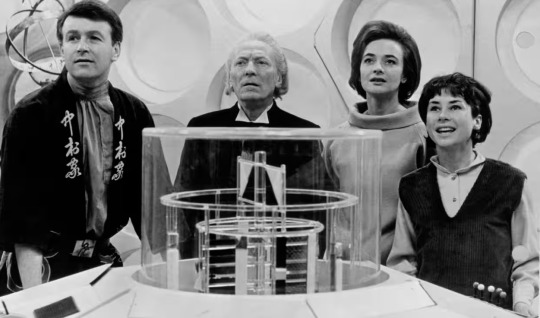
William Russell, left, as Ian Chesterton, with William Hartnell as the Doctor, Jacqueline Hill as Barbara and Carole Ann Ford as Susan in the Doctor Who serial The Keys of Marinus, 1964. Photograph: BBC
On 23 November 1963 – the day after the assassination of President John F Kennedy – the actor William Russell, who has died aged 99, appearing in a new BBC television series, approached what looked like an old-fashioned police box in a scrapyard, from which an old chap emerged, saying he was the doctor. Russell responded: “Doctor Who?”
And so was launched one of the most popular TV series of all time, although the viewing figures that night were low because of the political upheaval, so the same episode was shown again a week later. It caught on, big time, with Russell – as the science schoolteacher Ian Chesterton – and William Hartnell as the Doctor establishing themselves alongside Jacqueline Hill as the history teacher Barbara Wright and Carole Ann Ford as Susan Foreman.
Russell stayed until 1965, returning to the show in 2022 in a cameo appearance as Ian and, since then, participating happily in all the hoop-la and fanzine convention-hopping, signing and schmoozing that such a phenomenon engenders.
Before that, though, Russell had achieved prominence in the title role of the ITV series The Adventures of Sir Lancelot (1956-57) – he was strongly built with an air of dashing bravado about him; he had been an RAF officer in the later stages of the second world war – and as the lead in a 1957 BBC television adaptation of Nicholas Nickleby, transmitted live in 18 weekly episodes.
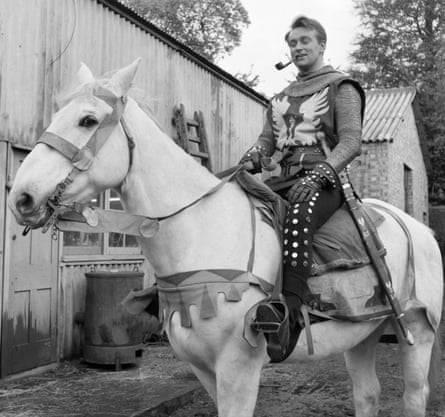
William Russell on the set of the 1950s television series The Adventures of Sir Lancelot. Photograph: Mirrorpix/Getty Images
When Sir Lancelot went to the US, the first British TV import to be shot in colour for an American audience, Russell rode down Fifth Avenue on a horse in full regalia, like some returning, mystical, medieval knight in the heart of Normandy. The show was a smash hit.
By now he was established in movies, playing a servant to John Mills in The Gift Horse (1952) and a clutch of second world war action movies including They Who Dare (1954) opposite Dirk Bogarde, directed by Lewis “All Quiet on the Western Front” Milestone – he met his first wife, the French model and actor Balbina Gutierrez on a boat sailing to Cyprus to a location shoot in Malta – and Ronald Neame’s The Man Who Never Was (1956), the first Operation Mincemeat movie, in which he played Gloria Grahame’s fiance.
Until this point in his career, he was known as Russell Enoch. But Norman Wisdom, with whom he played in the knockabout comedy farce One Good Turn (1955) objected to his surname because he felt (oddly) that it would publicise a vaudevillian rival of his called Enoch. So, somewhat meekly, and to keep Wisdom happy, he became William Russell, although, in the 1980s, for happy and productive periods with the Actors Touring Company and the RSC, he reverted to the name Russell Enoch. Later, he settled again on William Russell. All very confusing for the historians. His doorbell across the road from me in north London bore the legend “Enoch”.
He was born in Sunderland, the only child of Alfred Enoch, a salesman and small business entrepreneur, and his wife, Eva (nee Pile). They moved to Solihull, and then Wolverhampton, where William attended the grammar school before moving on to Fettes college in Edinburgh and Trinity College, Oxford, where his economics tutor was the brilliant Labour parliamentarian Anthony Crosland.
But Russell didn’t “get” the economics part of the PPE (philosophy, politics and economics) course and switched, much to Crosland’s relief, to English. In those years, 1943-46, he worked out his national service and appeared in revues and plays with such talented contemporaries as Kenneth Tynan, Tony Richardson and Sandy Wilson.
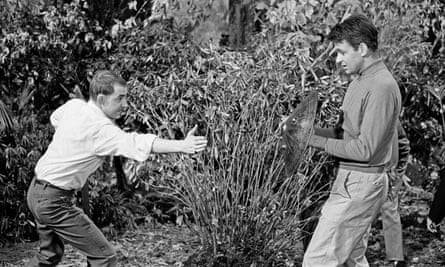
Derek Ware, a fight co-ordinator, runs through a scene with Russell during a break in filming the Doctor Who story The Crusades at the BBC studios, Ealing, in 1965. Photograph: Mirrorpix/Getty Images
On graduating, he played in weekly rep in Tunbridge Wells, fortnightly rep at the Oxford Playhouse and featured, modestly, in the Alec Guinness Hamlet of 1951 at the New (now the Noël Coward) theatre. He had big roles in seasons at the Bristol Old Vic and the Oxford Playhouse in the early 60s, while on television he was in JB Priestley’s An Inspector Calls with John Gregson, and was St John Rivers in Jane Eyre.
He played Shylock and Ford (in the Merry Wives of Windsor) in 1968-69 at the Open Air, Regent’s Park, before joining the RSC in 1970 as the Provost in Measure for Measure (with Ian Richardson and Ben Kingsley), Lord Rivers in Norman Rodway’s Richard III and Salisbury in a touring King John, with the title role played by Patrick Stewart.
His billing slipped in movies, but he played small parts in good films such as Superman (1978), starring Christopher Reeve, as one of the Elders; as a passerby drawn into the violence in the Spanish-American slasher film Deadly Manor (1990); and in Bertrand Tavernier’s Death Watch (1980), a sci-fi futuristic fable about celebrity, reality TV and corruption, starring Romy Schneider and Harvey Keitel.
With John Retallack’s Actors Touring Company in the 80s, he was a lurching, apoplectic Sir John Brute in John Vanbrugh’s The Provok’d Wife, possessing, said Jonathan Keates in the Guardian, “a weirdly philosophical elegance”; a civilised Alonso, expertly discharging some of the best speeches in The Tempest; and a quick-change virtuosic king, peasant, soldier and tsar in Alfred Jarry’s 1896 surrealist satire Ubu Roi in the Cyril Connolly translation.
Back at the RSC in 1989, he was the courtly official Egeus in white spats (Helena wore Doc Martens) in an outstanding production of A Midsummer Night’s Dream by John Caird, and both the Ghost and First Player in Mark Rylance’s pyjama-clad Hamlet directed by Ron Daniels. In 1994 he took over (from Peter Cellier) as Pinchard in Peter Hall’s delightful production of Feydeau’s Le Dindon, retitled in translation An Absolute Turkey, which it wasn’t.
He rejoined Rylance in that actor/director’s opening season in 1997 at the new Shakespeare’s Globe. He was King Charles VI of France in Henry V and Tutor to Tim in Thomas Middleton’s riotous Jacobean city comedy, A Chaste Maid in Cheapside. Many years later, in 2021, his son Alfred Enoch (Dean Thomas in the Harry Potter movies), would play on the same stage as a fired-up Romeo.
Russell is survived by his second wife, Etheline (nee Lewis), a doctor, whom he married in 1984, and their son, Alfred, and by his children, Vanessa, Laetitia and Robert, from his marriage to Balbina, which ended in divorce, and four grandchildren, James, Elise, Amy and Ayo.
William Russell Enoch, actor, born 19 November 1924; died 3 June 2024.
-- I'm a bit annoyed there's no mention of the fact that William continued to play Ian Chesterton for Big Finish.
95 notes
·
View notes
Text
Lost in the Book with Stitch Masterlist [Complete]
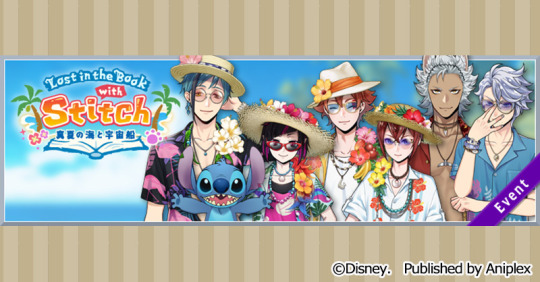
Episode 1
Part 1 | Part 2
Episode 2
Part 3 | Part 4 | Part 5 | Part 6 | Part 7 | Part 8 | Part 9 | Part 10 | Part 11 | Part 12
Episode 3-1
Part 13 | Part 14
Episode 3-2
Part 15 | Part 16 | Part 17 | Part 18 | Part 19 | Part 20
Episode 3-3
Part 21 | Part 22 | Part 23 | Part 24
Episode 3-4
Part 25 | Part 26 | Part 27 | Part 28
Part 29 | Part 30 | Part 31 | Part 32
Part 33 | Part 34 | Part 35
Episode 3-5
Part 36 | Part 37 | Part 38 | Part 39 | Part 40 | Part 41
Episode 4
Part 42 | Part 43 | Part 44 | Part 45 | Part 46 | Part 47 | Part 48 | Part 49 | Part 50 | Part 51
#twisted wonderland#disney twst#twst spoilers#lost in the book with stitch#floyd leech#twst floyd#lilia vanrouge#twst lilia#riddle rosehearts#twst riddle#azul ashengrotto#twst azul#ace trappola#twst ace#jack howl#twst jack#translations not 100% accurate#masterlist
257 notes
·
View notes
Text
September 26, 2023: Part 2 of 2 of episode 3's recap
On the way to the entertainment park, JK drives a motorcycle, Tae drives a scooter, and JM drives a car. This makes me think that Tae is comfortable with this type of vehicle, possibly indicating that he and JK ride together in their free time. Of course, these are just my personal observations, and I encourage you to form your own conclusions.

Timestamp 35:50
Isn't this sweet? This is another instance of JK demonstrating his protective nature towards Tae, always prioritizing Tae's safety. JK carefully follows behind Tae as they journey to the theme park, so he can watch out for Tae's safety. Upon arriving at the parking lot, JK takes the lead, skillfully guiding them to their designated parking spots. According to tcnckclnsmaek on TW, Kside are calling him Jeon-sweetheart (전다정).

https://x.com/tcnckclnsmaek/status/1824339602574020997?s=46&t=StSwHjW0_Domk_lHUFMaCg
https://x.com/happykv_9597/status/1824128463894352138?s=46&t=StSwHjW0_Domk_lHUFMaCg
https://x.com/firewaterkv/status/1824459967111328090?s=46&t=StSwHjW0_Domk_lHUFMaCg
https://x.com/newbuns/status/1824361013887840663?s=46&t=StSwHjW0_Domk_lHUFMaCg
The three go into the obstacle course site. Jk completes one of the courses twice, and Tae continuously watches while admiring both times, exclaiming “whoa” and complimenting that he makes it look easy (pic 1 is Jk’s first time on the course, pics 2-4 are his second time going). When Jk goes on a third obstacle, Tae and Jm both look on, with a small smile seen on Tae’s face as he watches him (pic 5).


Timestamp 37:37-38:46
Tae and Jimin go to race each other on the speed race obstacle. Jk is attentive to Tae, guiding him on where to put his feet, and keeping his eyes on him when he yells, “Go!” He even helpfully presses Tae’s button for him. Tae begins to race up before JM is ready, causing JM to laugh, hop down and say he’s not going (they all end up going individually, with Tae scoring 15 seconds, JM getting 21:50 seconds and Jk achieving 12 seconds).
JK’s conversation to Tae:
🐰: ready? foot down, foot down. Go!
🐰: he’s pretty fast
🐰: look at his legs go
🐰: 15 seconds!
🐰: you’re pretty fast!

Timestamp 40:35
https://x.com/angel_hemaya/status/1825080901266751517?s=46&t=StSwHjW0_Domk_lHUFMaCg
https://x.com/taekookinhawai/status/1825096188435267749?s=46&t=StSwHjW0_Domk_lHUFMaCg
In this heartwarming moment, Jk demonstrates incredible care and consideration for Tae as he comforts him. Tae finds himself scared at the top of an obstacle and expresses a desire to come down. Jk responds by climbing up an adjacent obstacle to offer support and reassurance, all the while cheering him on and letting him know, "V, I'm here. I'm here." It's a beautiful display of support and care.
The full conversation -
🐰: v i'm here
🐰: i'm here
🐻: hey jungkook-ah, do you think i can do this?
🐰: you can do this
🐣: you can do it
🐰: you got this! 💪🏻
🐻: okay i got this


Timestamp 45:38
https://x.com/nonakv99/status/1823992423002841142?s=46&t=StSwHjW0_Domk_lHUFMaCg
https://x.com/kookvtwins/status/1824012043541774575?s=46&t=StSwHjW0_Domk_lHUFMaCg
https://x.com/dionyxxsusttkx/status/1824013370686607853?s=46&t=StSwHjW0_Domk_lHUFMaCg
https://x.com/koolovrboy/status/1824011329491107869?s=46&t=StSwHjW0_Domk_lHUFMaCg
With a soft smile (hard to tell in the first still, but I tried to capture it), Jk can be seen watching as Tae jumps and succeeds in grabbing onto the cylinder. Jk applauds fervently while descending alongside Tae. In the background, JM can be seen and heard praising and joining in the applause for Tae's successful feat.

https://x.com/kkyukith/status/1824369366789493230?s=46&t=StSwHjW0_Domk_lHUFMaCg
https://x.com/firewaterkv/status/1824462112439062676?s=46&t=StSwHjW0_Domk_lHUFMaCg
When the three drive go carts, Jk sports a bright smile when he sees Tae has caught up to him -

Tae carries a soft smile on his face as he and JM watch Jk’s solo spin on the go cart, before loudly praising that he looks cool. Jk glances over as he passes by, biting his lip as he smiles at the praise.

Timestamp 54:30-54:38
https://x.com/flirtaeguk/status/1824069819056206283?s=46&t=StSwHjW0_Domk_lHUFMaCg
https://x.com/jungkovtae/status/1824057008963604865?s=46&t=StSwHjW0_Domk_lHUFMaCg
https://x.com/vkookmyfamily/status/1824045561126748388?s=46&t=StSwHjW0_Domk_lHUFMaCg
https://x.com/borahae_tk_/status/1824085900193923431?s=46&t=StSwHjW0_Domk_lHUFMaCg
Also, it’s important to note the company absolutely set up this leg of the trip for three people, despite what some on social media attempt to claim. As pointed out by others, all three had bags of sponsored clothes (three sets of shoes, jackets and shirts), there were 3 water guns and cameras laid out, and Tae’s favorite wine was stocked up.


https://x.com/9123kv/status/1825523243643711850?s=46&t=StSwHjW0_Domk_lHUFMaCg
https://x.com/targsitions/status/1825616312237764638?s=46&t=StSwHjW0_Domk_lHUFMaCg
And you can see the layout of the home they rented here, which has 2 bedrooms, in addition to a sleeper sofa in the living room. I’m sure the set up of all three sleeping in one room was for show, but decide as you like.

https://x.com/9123kv/status/1825187936822083657?s=46&t=StSwHjW0_Domk_lHUFMaCg
https://x.com/oys_tk/status/1824851351458783309?s=46&t=StSwHjW0_Domk_lHUFMaCg
Full episode - https://x.com/btslinkita/status/1823997901904752651?s=46&t=StSwHjW0_Domk_lHUFMaCg
30 notes
·
View notes
Text


Incentive to give up Magical Cosmic Power: 0
Episode 53 Part 37
First < Previous > Next
Season 1, Season 2, Season 3, Season 4, Season 5
Ep 41, Ep 42, Ep 43, Ep 44 Ep 45, Ep 46, Ep 47, Ep 48, Intermission, Ep 49, Ep 50, Ep 51, Ep 52
Bonus:

(the problem with drawing myself into these as a cameo is that I NO LONGER LOOK LIKE THAT)
Ko-fi
#'randos on the internet could figure it out' AND THEY DID#SO MANY DECODED IT DURING THE GREAT HIATUS!!#IT'S LAUGHABLE TO THINK IT'S HARD#scarlet lady#scarlet lady au#scarlet lady comic#mayura#episode 53 part 37
4K notes
·
View notes
Text
Her || Charles
Main characters: Charles Leclerc x OC
Genre: fanfiction, fluff
Story type: novel
Part: 6/?
Word count: 2006
Co writer: @mistrose23
Story summary: Matilde Jørgensen, the new Scuderia Ferrari team principal, faced the nerve-wracking challenge of reviving the team's fortunes and aiming for a championship. Leading a historic team as a 'newbie' and separating her work and personal opinions posed a significant challenge. The big question: is she capable to do so?

Previous chapter
Chapter 4. F1 Giggles & Tea
"Another week, another episode of F1 Giggles & Tea," the girl with the blonde hair opened the podcast with her friend, her voice carrying a cheerful tone. "Today we are gonna talk about Matilde Jørgensen."
The girl with brunette hair, the co-host of the podcast, nodded and smiled widely. "The girl boss of the grid."
"The team principal of Ferrari."
"Not gonna lie, she is living the dream," the blonde girl said.
"Although she isn't the first female team principal in F1, she certainly is one of the youngest."
"Only 29 years old!" The girl with blonde wavy hair raised her eyebrow. "Did you know who she was before she joined Ferrari?"
The brunette slowly shook her head. "She wasn't on my radar until she debuted as team principal. The thing in F1 is that you will not be known until you do something special, or if you are a head of department or a principal."
"Yeah, it's a shame, actually. There are so many people working behind the scenes. But I looked Matilde up, because I feel like we need to give her a platform. She is a team principal, but I'm quite curious to know how she got there," the girl with the brown hair said and took a sip of her coffee. Even though the podcast was called F1 Giggles & Tea, the girl preferred iced coffees. But the name was nice. The co-host nodded. "Matilde Jørgensen is from Denmark. I found on her Instagram that she was born on October the 8th, and she is 29 years old-"
"I still cannot believe she is a team principal under 30. It's really impressive."
"I mean, it feels like Ferrari had no candidates but Matilde, like she was the only one who applied for the job, no offence to Matilde." They both laughed. "Anyway, she studied at the Technical University of Denmark: Engineering in IT and Economics, also doing a mathematical degree at the same time. She got a placement at Red Bull Racing in IT. After that, she got a job within Red Bull as a strategist, and worked her way up to Senior Strategist, working closely with Hannah Smitz. And now she is the team principal of Ferrari."
The brunette looked impressed. "It sounds so easy," she said. "And that while only being 29 years old."
"I'm 25 and I can't handle my job at the supermarket."
"I'm still crying myself to sleep over my studies." Laughter filled the podcast. "But to our comparison: how is she doing her job so far? Let's compare her to last year's season."
The girl with blonde hair nodded and grabbed her notes. "Bahrain, 2022: Charles p1 and Carlos p2 In 2023: Charles P5 and Carlos p4. Saudi Arabia, 2022: Charles p2 and Carlos p3. In 2023: Charles p4 and Carlos p5. Australia, 2022: Charles p1 and Carlos DNF. In 2023: Charles p2 and Carlos p4," she said. "Baku was after Monaco, but this year it is before Miami. So Baku, 2022: Charles DNF and Carlos DNF. In 2023: Charles p4 and Carlos p2."
"Hmm, it sounds like the start of 2022 was more promising than this year," the brunette mused.
"Yes, but let's be honest: the end of 2022 was a disaster for Ferrari. God knows what Mathilde had to deal with when she got there. I can imagine it was a mess," the blonde girl smirked. Let's compare the results so far after four races, shall we? Charles had 78 points in 2022 and currently has 53 points. Carlos had 33 points in 2022 and now has 46 points. In 2022 Ferrari had 96 points and they have 99 points in 2023. An overall difference of three points."
It was silent.
"It's... I hope they will stay consistent."
The blonde girl sighed. "I mean, Carlos has more points now. And the team has three more points. It's not a downward trend. Considering where Ferrari came from last season, it has improved already. I feel like the team is doing better, but we will find that out later this season."
"I hope this girl boss will fix this team. But first the next Grand Prix: Miami!"
* * *
The Floria sun blazed brightly in the midday sky as Matilde and the team gathered at the entrance of their hotel in Miami. The past few weeks had been a whirlwind of race weekends and a lot of travel and it was intense. Someone from the media team proposed to go to the beach with the entire team. It was a much-needed break; it helped to adjust to the jet lag as well.
Matilde, who wore blue and white coloured linen shorts, a dark blue top and a white shirt, exchanged smiles with her colleagues as they gathered around in the lobby. The atmosphere was quite uncomfortable, perhaps it was because their team principal, their boss, was joining the team on a day out. At first, Matilde doubted going, because she would feel uncomfortable too, but Gemma convinced her to go, to work on the team building.
A few minutes later, the team made their way to the beach. Groups were formed, and people were talking. Matilde found an English girl among the hospitality people, they bonded because they both used to work for different teams. Liza used to work at Alpine and she started her job at Ferrari last year, one year ahead of Matilde. They could talk about Red Bull and Alpine and the things they had gone through.
The beach was a lively tableau of vibrant umbrellas, laughter and crashing waves. As Matilde and her team claimed an entire beach club, they settled down and ordered some drinks. Matilde sat down on a sunbed, looking around; almost the entire team was Italian, but there was a mix of nationalities and personalities after all. However, the common thread that bound them was their shared passion for racing.
Some people decided on dipping in the sea, others decided to work on their tan, or spend time together. Matilde grabbed a book out of her bag and decided to keep it to relax. She was reading the latest book by Norwegian writer Jo Nesbø.
"Oh, Jo Nesbø. My mum reads his books as well," Liza said. "She thinks they are amazing."
Matilde closed the book, realising reading wouldn't work. Her mind wasn't committed to it, she had too many thoughts racing through her head. "He is one of my favourite writers."
"It's so cliche, but I'm currently into reading those cheesy romances. Sarah Jio is currently my favourite writer," Liza replied and took a sip of her mojito.
A smirk left Matilde's mouth. "I read The Last Camellia on the plane. It's easy to read and it has such an amazing plot."
Liza nodded. "I loved that one too. Cliche, but good." She looked at the sea. "I don't know if you know this, or heard it, but there's a podcast going viral on TikTok. The viral episode is an episode about you."
Matilde raised her eyebrows. "I had no idea. What did they say?"
"Not much, but they talked about who you are since they didn't know much about you. They kinda dug into your history. Nothing personal came up, which made them frustrated," Liza chuckled. "Nothing negative."
"Who?"
"Two girls, they're hosting the 'F1 Giggles & Tea' podcast."
Matilde nodded. "I see." For the last few weeks, the media and fans have been very critical of Matilde. And she had to agree with them, because she too would create an opinion on a new team principal as well, but now that she was a team principal and people had an opinion on her, she had a different opinion on it. It felt unfair, because no one knew what she was doing and all the negative quotes were harsh on her. "I mean, I already read a few articles, positive articles, on how much they praise me for being a female team principal."
"You're doing a great job, Matilde. Ignore the media. Claire Williams did the same."
"As much as I respect Claire, things went downhill at Williams when she was the team principal."
"Then show them that you can do it. The Italians are tough, but you got this."
"I like your way of thinking."
"Give me a raise and we will talk again."
A laugh rolled over Matilde's lips. "We will see. Alright, enough about the media, I'm going to swim."
Liza nodded. "I will stay here and finish my drink. Will be there in a few minutes."
"Yes." Matilde got up and put on her sunglasses, making her way to the sea.
It was not like she was insecure about her body, but she knew that she didn't have a model body. She didn't have a six-pack, toned legs or arms. There was fat, she was midsized, skinny fat. And she was fine with it, she wasn't a gym girlie. But seeing all these models on the beach made her feel slightly uncomfortable.
While the team was enjoying a beach day, Charles had to follow his training scheme. He and his trainer Andrea were also on the beach. Andrea pushed Charles to his limit and it worked; Charles hated it and Andrea liked it.
As the training session progressed, Charles couldn't help but let his gaze wander occasionally towards the beach. He noticed some people from his team and it made him jealous. They relaxed on their day off and he still had to train. His eyes fell on a woman in a black bikini who was walking towards the sea. He tightened his jaw. His eyes lingered on Matilde's figure, she had beautiful curves. His attention was divided between the workout and the sight before him.
Andrea, noticing Charles' distraction, raised an eyebrow. "Focus," he said, his tone stern. "You're here to train, not to daydream."
Charles snapped back to attention, giving a sheepish grin. "Yep."
"Keep your focus on the workout, or you won't win."
As the workout continued, Charles struggled to keep his attention on his training. His eyes were inexplicably drawn to Matilde. She was talking to some other girl, both only having their feet in the water. Charles found himself following her movements, his concentration shattered.
Matilde walked further into the sea, the cool water offering a refreshing feeling from the sun's heat. She listened to Liza, who shared a story about a race she would never forget. Matilde let out a satisfied sigh, enjoying the sensation of the waves washing over her.
Andrea's patience wore thin as he watched Charles' lack of focus. With a sigh, he tossed a ball towards Charles, aiming it directly at his head. The ball made contact, snapping Charles out of his reverie.
"Ouch!"
Andrea crossed his arms, his annoyance was evident. "Maybe if you paid as much attention to your training as you do to whatever is distracting you, you would have caught that ball."
Charles muttered an apology, forcing himself to re-engage in the workout. But his eyes kept on wandering towards Matilde, who was now walking out of the sea, droplets of water clinging to her skin. His heart raced as he tried to regain his focus, but it was a tough battle.
Finally, Matilde saw Charles looking in her direction, and a small smile tugged at the corner of her lips. She had to pass him to go back to her sunbed. "Ah, lovely to train outside instead of the gym," she commented, her tone light and warm.
"Yes, quite the change of scenery," he replied curtly, his gaze flickering away. The response was colder than they both expected it to be.
Matilde squeezed her eyebrows together, sensing the change in his attitude. She was taken aback by his abruptness, but before she could reply to him, Charles turned his attention back to his workout. Matilde walked away, shook her head and walked back to her sunbed, following Liza.
As the workout processed, Charles pushed himself through the rest of his training, determined to shake off his distraction. But the memory of Matilde walking out of the sea, water glistening on her skin, lingered in his mind, igniting a spark of attraction that he couldn't ignore.
Next chapter
#charles leclerc#f1#formula 1#ferrari#carlos sainz#carlos sainz jr#max verstappen#kevin magnussen#fanfic#motorsports#formula one#charles leclerc x oc#fluff#charles leclerc fanfic#charles leclerc fluff#scuderia ferrari#james beaufort reader#Charles Leclerc fanfic#Charles Leclerc fanfiction#formula 1 fanfic#f1 fanfic#f1 fanfiction#formula 1 fanfiction#f1 fic#charles leclerc imagine
47 notes
·
View notes
Text
Slam Dunk ep. 46: Hanamichi, Hot Dunk - an analysis

By far, one of my favorite episodes.
So, I was watching this episode yesterday and I started wondering about everybody's reaction to Sakuragi's dunk. Everybody is extremelly shook and I wondered why even Rukawa was extremely surprised. In addition, Sakuragi's reaction when he was sent off the court is one of my favorites parts, and I really wanted to analyse it to talk about character development.
Beginning with the audience reaction to Sakuragi's dunk. We cannot question that Sakuragi's dunk was on NBA level because:
Strenght: the whole structure of the backboard shook dangerously. Not even Akagi could make the backboard shake like that with his dunks. Even if it was a miscalculation of strengh, is still frightening, because Sakuragi showed all his arm strengh with that dunk;
Marking/blocking: Sakuragi didn't dunk alone: he dunked being marked by two Shoyo players, and one of them was Hanagata. Hanagata is 9 centimeters taller than Sakuragi and much more experienced. Also, Hanagata was easily thrown on the floor by Sakuragi, and we can feel that it was quite of a blow;
Jump: Sakuragi almost flew! He jumped far from the basket, doing an authentic air walk like Jordan! His jump is frighteningly powerfull, and being able to dunk with such a strenght after making a huge jump like that...
He made it: Sakuragi is shown during the show missing a lot of dunks because of his lack of space notion. He didn't have experience enough to know the important distances in basketball. He has to have a space notion to jump and dunk, doing the arm movement in the right timing. Jumping and dunking was a challange for him without being marked. It's shown that Sakuragi had struggles with the psychological pressure during his first "official" match against Ryonan. He also struggles with the fouls and the pressure they put on his shoulders, mainly during Shoyo's match. In this play, Sakuragi dunks in the last minutes of a super tense decisive match, he already had 4 fouls, he was being marked by two players that were taller and more experienced than him and he jumps too far from the basket. He literally overcomes all the limits he had in one single play!
Now about Sakuragi's reaction to his own dunk is the "cherry of the cake". The dunk itself shows his ability development, and to make a good character, this ability development has to happen with a character development.
I strongly believe that Sakuragi's loud behavior, specially during the matches is a defense mechanism against his own thoughts. Deep on his mind, I believe we could find lot of insecurities, that he tries to silence with his ORE WA TENSAAAAAI screaming. Maybe, watching Rukawa and the other players around him, made him think many times, deep in his mind, that he couldn't be good enough. So he put a goal based on Haruko's words about the play "Slam Dunk": if he could make it, he could beat Rukawa and own Haruko's love. However, on his way to make a slam dunk during a match, he found out that basketball is much more than doing a slam dunk. But he only get conscious of this discover when he finally does the slam dunk during an official match. Sakuragi realized, at that moment, that:
He could be good enough at basketball;
Basketball is fun;
He wants to stay at the court the whole game to feel more of that sensation he felt during the dunk;
To stay on the court the whole game, he has to cool down and be less impulsive;
That's when he says that to Ayako. He's starting to take basketball seriously because he's starting to like it. All his chaotic energy finally can be redirected to something he likes and makes him feel like any fight couldn't ever make.
I just love love how Slam Dunk shows in Sakuragi's development how precious and necessary is the virtue of order. If we can order our potentials to something virtuous (like a sport), we can discover meaning on our lives and walk on the marvelous and frighting way of self-mastery;
#slam dunk#slam dunk anime#slam dunk manga#sakuragi hanamichi#hanamichi sakuragi#slam dunk movie#the first slam dunk#slam dunk character analysis#character development
21 notes
·
View notes
Text
Hawk & Tim's scenes in chronological order
Okay, so I made a list with the timestamps of each scene between Hawk and Tim to be able to watch them in chronological order (you know, to make everything even more painful). I already watched through it yesterday and it worked well, so I thought I might share it.
Note that this only includes direct interactions between Hawk and Tim. The only scenes I included where they didn’t interact directly is Mary telling Tim that Hawk betrayed him, the letter Lucy burned, and the final scene at the AIDS quilt.
If you want to watch their entire story, including all the scenes of them talking about each other, I honestly think it’s easier to just watch the episodes in order and skip to the right parts (maybe I’ll also do another one for the entire series).
I hope I didn’t forget anything. Also, I can't gurantee that everything will be 100% accurate - it probably depends on where you watch the show (e.g. if the upload comes without the recap of the previous episode, this will probably be off)
(Below the cut due to length)
1952-54
Episode 1:
4:00 – 6:15
11:11 – 14:10
17:04 – 18:34
20:32 – 30:31
37:20 – 42:13
43:07 – 43:32
45:16 – 49:07
55:00 – 57:56
1:00:08 – 1:00:59
Episode 2:
6:18 – 10:45
36:40 – 37:31
39:37 – 43:49
Episode 3:
9:32 – 11:47
2:02 – 2:23*
13:39 – 15:39
23:08 – 25:33
28:22 – 31:53
34:26 – 38:08
41:50 – 44:07
52:08 – 53:56
Episode 4:
25:42 – 33:20
Episode 5:
6:41 – 8:22
20:07 – 21:49
42:12 – 44:00
51:16 – 55:20
(unspecified year in the 1950s)
Episode 6:
46:58 – 47:44
1957
Episode 8:
10:10 – 13:41
25:08 – 31:42
39:46 – 41:13
47:31 – 49:25
50:34 – 51:58
1968
Episode 6:
6:15 – 7:02
8:33 – 10:18
13:12 – 16:34
28:50 – 31:48
41:15 – 43:38
49:04 – 50:09
1979
Episode 7:
6:06 – 10:33
15:12 – 18:04
20:11 – 24:53
27:37 – 30:06
34:55 – 40:02
45:23 – 47:29
49:32 – 51:40
1986
Episode 1:
57:57 – 59:31
Episode 2:
46:04 – 48:29
56:42 – 57:02
Episode 3:
2:24 – 5:26
25:33 – 27:37
53:57 – 55:43
Episode 4:
3:52 – 7:05
22:30 – 24:50
Episode 5:
2:05 – 3:00
55:20 – 56:10
Episode 6:
2:00 – 2:50
Episode 7:
54:50 – 56:12
Episode 8:
4:43 – 7:43
38:46 – 39:46
41:14 – 43:50
44:38 – 44:52
46:08 – 46:18
51:59 – 58:42
1:04:04 – 1:06:02
75 notes
·
View notes
Text

Tuesday, May 7, 2024
It felt like there was more writing than usual today, so my hand started hurting. I had to switch to typing for a few things, but that's okay. For some reason, I also started to feel quite fatigued just before my lunch break this morning. I made some green tea to drink with lunch, and that seemed to help. Normally my parents don't like me having caffeine, but they are okay with me having it if I feel like I need it. They aren't fans of it on a daily basis, which is strange because I know both of my parents drink coffee every morning!
I hope everyone is doing well this week! I know it is the end of the academic year for some of us, and it is a very stressful time! But we got this! We are almost done! <3
Tasks Completed:
Geometry - Probability Review + honors review
Lit and Comp II - Reviewed Units 4-6 vocabulary + read the news + submitted fable writing assignment to Mom for grading (97%) + looked over non-fiction writing assignment + CLEP Test practice question
Spanish 2 - Reviewed La Comida vocabulary + reviewed the preterit and imperfect
Bible I - Read Matthew 19-20
World History - Watched a video on Margaret Thatcher + read about Indira Gandhi + read about Golda Meir + typed up a paragraph for each female world leader (typed because I wrote out a lot today and my hand hurt)
Biology with Lab - Answered questions about flower structure and reproduction + continued germination lab
Foundations - Read more on virtue + completed the next quiz on Read Theory + worked on the outline for my argumentative speech
Piano - 60-minute piano lesson + practiced for one hour
Khan Academy - Completed High School Geometry daily mastery challenge + completed High School biology daily mastery challenge + completed World History Unit 6: Lesson 12 (parts 2-3)
CLEP - Completed Sample CLEP Test Questions 46-60
Streaming - Watched The Cuba Libre Story Episode 7
Duolingo - Studied for approximately 30 minutes (Spanish, French, Chinese) + completed daily quests
Reading - Read pages 196-228 of Into the Bright Open by Cherie Dimaline
Chores - Laundry
Activities of the Day:
Personal Bible Study (Philippians 3)
Ballet
Pointe
Journal/Mindfulness
#study blog#study inspiration#study motivation#studyblr#studyblr community#study community#study-with-aura
49 notes
·
View notes